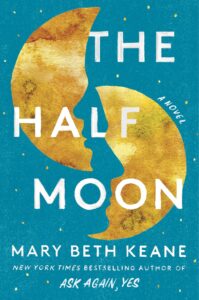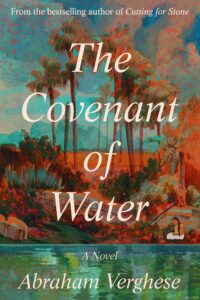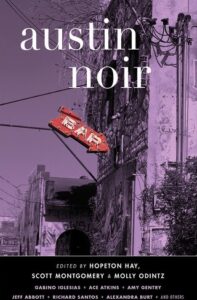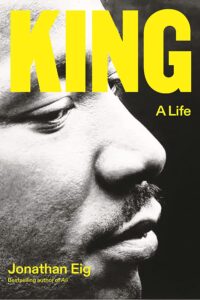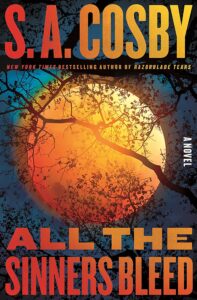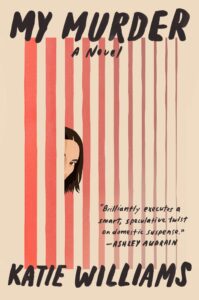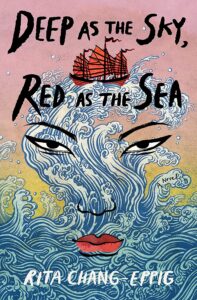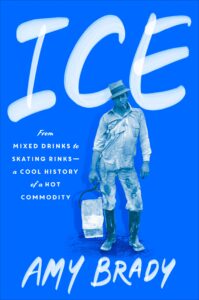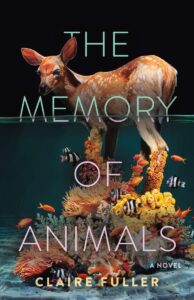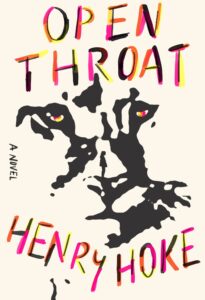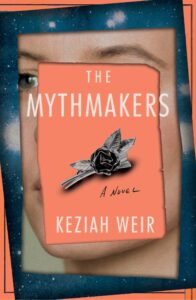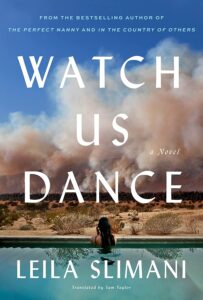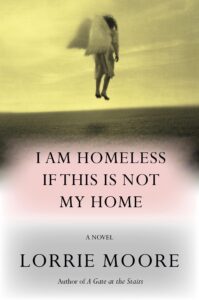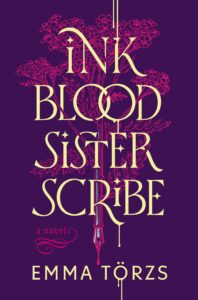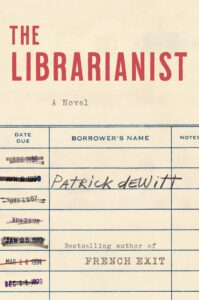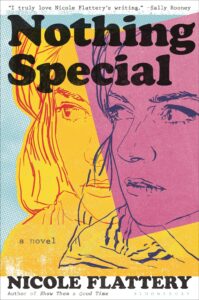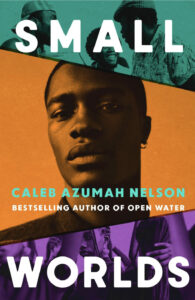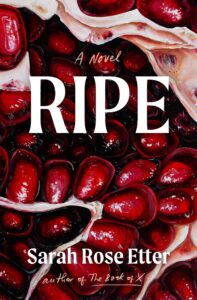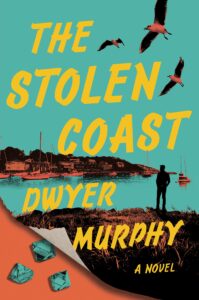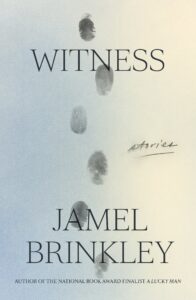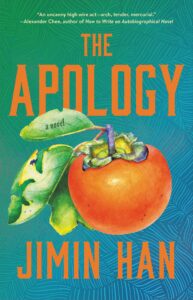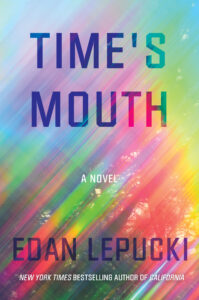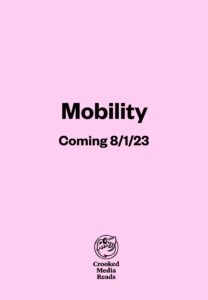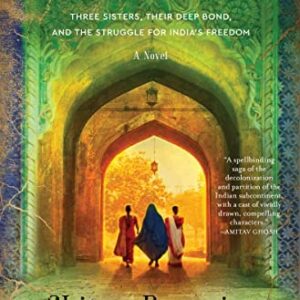Happy New Year, readers. 2022 had its ups and downs, along with some very good books. But now that you’ve read all the books last year had to offer (right?) it’s time for a brand new list.
Here are the books Literary Hub editors are most looking forward to (so far!) in the months to come.
JANUARY
Deepti Kapoor, Age of Vice
Riverhead, January 3
A whirlwind, madcap adventure to rival your favorite crime tv binge, set in a contemporary India suffused with money, violence, and power, and following a colorful cast of characters: gangsters, journalists, fraudsters, servants on the come-up, servants on the come-down. Read for a very good time. –Emily Temple, Managing Editor
Allegra Goodman, Sam
Dial Press, January 3
Allegra Goodman’s latest novel features that tricky thing: a child protagonist. The book follows Sam from ages seven to 19 as she struggled with her father’s erratic behavior, her mother’s turbulent relationship, and the universal mandate to grow up. I love a coming-of-age story told in the moment when the author has a deft hand, and given Kevin Wilsons’s ringing endorsement—he called SAM “one of the most evocative and tender examinations of youth that I’ve ever read”—I have no doubt that Goodman pulls it off. –Jessie Gaynor, Senior Editor
Parini Shroff, The Bandit Queens
Ballantine, January 3
One of the most talked-about debut novels of the year lives up to the hype and then some. The story of Geetha, a tough-but-wounded young woman in a remote Indian village who, after her abusive husband disappears, gains a reputation as a black widow. These rumors prove somewhat beneficial to Geetha in her desire to be left alone…until other women start approaching her for help in disposing their own shitty husbands. Uproarious, tender, and at times quite harrowing, with razor-sharp dialogue and a truly magnificent cast of characters, The Bandit Queens is a darkly hilarious delight of a novel. –Dan Sheehan, Book Marks Editor-in-Chief
Sean Adams, The Thing in the Snow
William Morrow, January 3
The HarperCollins Union has been on strike since November 10, 2022. Literary Hub stands in solidarity with the union. Please consider donating to the strike fund.
The Thing in the Snow is bizarre in the best way possible. A small group of workers at a remote arctic facility spend their days testing chairs and counting desks, keeping the huge research station in moderately working order. One day, they spot a suspicious thing in the snow just outside. It seems to move. It must have an agenda. But what could it possibly want?! –Molly Odintz, CrimeReads Senior Editor
Matthew Dennison, Roald Dahl: Teller of the Unexpected: A Biography
Pegasus, January 3
Where were you the first time you read one of Roald Dahl’s stories for adults, and realized he wasn’t quite as sweet and innocuous as he comes off in his children’s books? I had the jarring, ultimately horrifying, experience of reading Switch Bitch when I was 20, barely believing it was written by the same man who’d come up with such beloved tales as Matilda and Charlie and the Chocolate Factory. When you look up this specific book of stories, Switch Bitch, Wikipedia will tell you it is “linked by themes of rape by deception”, and the cover is something you just have to see for yourself. Horrible!
All to say, Matthew Dennison has taken on the monumental task of encompassing the contradictions within this man who offered our childhoods such whimsy, though when you read those same children’s stories a little more closely, had a predisposition to cruelty and punishment that is more apparent when you read his adult oeuvre in tandem. It’s biographies like these that are all the more exciting for the conflicts within, no man is straightforward, but Roald Dahl is undoubtedly a figure that calls for deep excavation. –Julia Hass, Contributing Editor
Cheuk Kwan, Have You Eaten Yet? Stories from Chinese Restaurants Around the World
Pegasus, January 3
Writer and filmmaker Kwan explores the Chinese diaspora by taking a journey through Chinese kitchens—and sharing the stories of those who populate them—all over the world. A book about identity, social history, global ethnography, changing politics, economic realities, and the strength of family, all wrapped up with that most important of cultural touchstones: food. –ET
Franz Kafka, tr. Ross Benjamin, The Diaries of Franz Kafka
Schocken, January 10
The first time I read The Metamorphosis, I was in high school. We all found it deeply troubling. Also, sort of fun. We didn’t yet know that you were allowed to do something like that in literature, that your main character could just wake up as some sort of vermin one morning! How exciting! How cruel! What must’ve happened to the writer to make him even conceive of such a conceit? And, more importantly, if you could peer inside the mind of the genius that brought us that f*cked up story, wouldn’t you want to? This new translation of Franz Kafka’s diaries, translated by Ross Benjamin, promises to offer an intimate glimpse of the artist at work, the man behind the curtain. From 1909 to 1923, these diaries entries convey daily observations, wild dreams, the seeds of stories, and (the best for last) “passages of a sexual nature that were omitted from previous publications.” Sign me up! –Katie Yee, Associate Editor
Leigh Bardugo, Hell Bent
Flatiron, January 10
I loved Leigh Bardugo’s first Alex Stern book, Ninth House—basically the perfect book for adults who miss the fantasy novels of their youth. Anyway, the literary fiction world does sequels now, and I’m here for it. Time to go back to the most terrifying version of Yale you’ve ever imagined. –ET
Laura Zigman, Small World
Ecco, January 10
The HarperCollins Union has been on strike since November 10, 2022. Literary Hub stands in solidarity with the union. Please consider donating to the strike fund.
Two newly divorced sisters move in together for the first time in 30 years, reacquainting themselves with each other, and in result, with their joint childhood and all its unresolved baggage. Joyce and Lydia grew up with a sister with special needs, Eleanor, and parents who were gung-ho disability activists, who possibly gave too much time to the cause and not enough to their children. It’s up to Joyce and Lydia, this much time later, to understand the years spent together in that house long ago, their grief from Eleanor’s premature death, and the mysteries that still revolve around their specific history—domestic and personal, nuanced and poignant, Small World offers a new map of how to move forward from a heavy past. –JH
Jordan Harper, Everybody Knows
Mulholland, January 10
In this pitch-dark version of Chinatown in the #metoo era, a publicist who specializes in getting scandals to go away finds herself in possession of a secret too big to bury. Harper has written for television as well as crafting novels, and his experience with dialogue shines in the propulsive pages of this novel. There are no wasted moments in this book, and every gun is Chekhov’s. When Everybody Knows gets adapted, they won’t need to change a thing. –MO
Janet Malcolm, Still Pictures: On Photography and Memory
FSG, January 10
Janet Malcolm—legendary journalist with a sharp eye, a penchant for the meta-narrative, and style for days—died last year at the age of 89. In Still Pictures, her posthumous memoir, Malcolm considers not only her own memories but the act of memory-making itself—very on brand, and very appealing. –ET
Kashana Cauley, The Survivalists
Soft Skull, January 10
Kashana Cauley is one of the funnier people alive today, full stop. Between working on The Daily Show with Trevor Noah and writing for the Fox comedy The Great North, somehow Cauley found the time to finish The Survivalists, a darkly comic novel set in gentrifying Brooklyn about some very contemporary questions, chiefly: “Is it worth navigating the grind of late capitalism if the world is coming to end? And with whom should we spend whatever time is left to us?” And while Cauley doesn’t necessarily have the answers, it’s going to be fun trying to figure it out. –Jonny Diamond, Editor in Chief
Maria Dong, Liar, Dreamer, Thief
Grand Central, January 10
Maria Dong’s debut is both a twisty psychological thriller and a nuanced exploration of mental illness. The narrator of Liar, Dreamer, Thief is a quiet young woman grounded by her daily rituals and overwhelmed by the world around her. She’s more than curious about a coworker, and her reality begins to unravel when she realizes her coworker is just as curious about her. What is he hiding, and why does she so desperately want to know? The extremely satisfying conclusion will leave you gobsmacked. I gobbled this one up in an evening, and I highly recommend it for the cold nights ahead. –MO
Tracy Kidder, Rough Sleepers
Random House, January 10
It’s a shame that America still requires of its citizens a particular kind of moral virtuosity to grapple with the most basic problems of societal iniquity. Nonetheless, we must celebrate these prodigies of good work when we encounter them. So has Tracy Kidder done with Dr. Jim O’Connell in Rough Sleepers, the story of one man’s efforts to bring healthcare to Boston’s unhoused population, along with compassion, kindness, and humanity. I wish we didn’t need the Jim O’Connell’s of the world, but I’m glad we have them. –JD
Henry Marsh, And Finally
St. Martin’s Press, January 17
One of Lit Hub’s first viral posts was an excerpt about brain aneurysms from Dr. Henry Marsh’s Do No Harm. Marsh, one of Britain’s foremost neurosurgeons, writes about the brain in practical prose, a clarity which makes, well, brain surgery seem not too difficult to understand. In his new novel, And Finally, Marsh delivers a more personal exploration of death, life and neuroscience. Now retired, Marsh is diagnosed with advanced cancer. As someone who has spent his entire life facing the potential death of his patients, he now must contemplate what death means to him. –Emily Firetog, Deputy Editor
Dan Kois, Vintage Contemporaries
Harper, January 17
The HarperCollins Union has been on strike since November 10, 2022. Literary Hub stands in solidarity with the union. Please consider donating to the strike fund.
I find Dan Kois’ nonfiction writing reliably delightful, so I’m excited to crack open his debut novel. Set in New York City beginning in the 1990s, Vintage Contemporaries follows Em, a young Midwesterner who moved to the city to pursue a career in publishing (yes, thank you) and her new close friends—Emily and Lucy—two very different women, both equally committed to art. Em loses touch with both women as her career advances and her personal life becomes consumed by marriage and parenthood, but after Lucy’s death, she and Emily rekindle their friendship, forcing Em to examine her life through a new lens. –JG
Alba de Céspedes, tr. Ann Goldstein, Forbidden Notebook
Astra House, January 17
Alba de Céspedes’s classic domestic novel was first published in Italy in 1952; now, it’s being reissued with a translation by Elena Ferrante’s translator, Ann Goldstein, and a foreword from Jhumpa Lahiri, who calls Céspedes one of Italy’s most “incendiary, insightful, and overlooked writers.” The story centers around a middle-class housewife and mother in postwar Rome, who’s unable to articulate her dissatisfactions until she begins writing in a—you guessed it—forbidden notebook. Sounds like the perfect winter read to me. –Eliza Smith, Special Projects Editor
Daniel Torday, The 12th Commandment
St. Martin’s Press, January 17
Full disclosure, Daniel Torday has contributed several great essays to Lit Hub: as a writer he is erudite, provocative, and deeply humane. So I am very much looking forward to The 12th Commandment, which follows a heavily religious Judeo-Islamic sect that has journeyed from Brooklyn deep into the rural Midwest at the behest of their “prophet” Natan. Things take a dark and murderous turn, which lures visiting New York journalist Zeke Leger into an ever-thickening mystery. –JD
Italo Calvino, tr. Ann Goldstein, The Written World and the Unwritten World: Essays
Mariner Books Classics, January 17
A new collection of the brilliant Italian writer’s essays, forewords, articles and interviews—all previously untranslated and many previously uncollected—to add to the personal library of any completist. –ET
Bret Easton Ellis, The Shards
Knopf, January 17
Bret Easton Ellis is back, this time with a new serial killer novel that brings together all the best aspects of Less Than Zero and American Psycho. It’s 1981, Missing Persons is playing on the stereo, and future writer Bret is doing bumps with his prep-school friends by the poolside, dressed sharply in Ralph Lauren, as a killer makes his way closer and closer to their wealthy enclave. Ellis’ teenage emotional truths collide with violent fictional set-pieces for an epic tale of Southern Californian sins. –MO
Colm Tóibín, A Guest at the Feast
Scribner, January 17
Colm Tóibín has written more superb novels than you’ve had hot dinners (Brooklyn, The Master, The Blackwater Lightship, and Nora Webster, etc) but if you’ve only read his fiction, you’ve been missing out on a wealth of wonderful essays and criticism. In his new collection, Tóibín recalls his recent cancer diagnosis, profiles three popes, writes about a trio of authors who deal with religion in their fiction, and considers the long, tragic journey toward legal and social acceptance of homosexuality in Ireland. Not to be missed. –DS
Mario Vargas Llosa, tr. John King, The Call of the Tribe
FSG, January 17
There’s a special pleasure in a book that guides you through how a brilliant mind works, which is exactly the promise of Vargas Llosa’s “intellectual autobiography.” Here, the Nobel Prize winner surveys the readings that have shaped his political and social ideologies. Though I disagree with Vargas Llosa on many political points, I’m a great admirer of his writing, and I look forward to a thought-provoking read. –JG
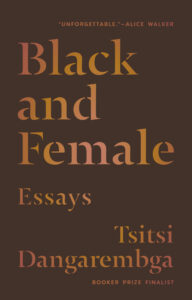
Tsitsi Dangarembga, Black and Female: Essays
Graywolf, January 17
In both Nervous Conditions and This Mournable Body, Tsitsi Dangarembga used an unforgettable protagonist to explore the cost of colonialism and its intimate effects and the conflation of the personal and political. Now, the writer is exploring similar territory from a more personal angle. In Black and Female, Tsitsi Dangarembga covers her childhood cleaved from her family; the political landscape of Zimbabwe; and her road to writing. If her novels are any indication of her power as a writer, I’m eager to see what she can do with the essay form. –KY
Monica Heisey, Really Good, Actually
William Morrow, January 17
The HarperCollins Union has been on strike since November 10, 2022. Literary Hub stands in solidarity with the union. Please consider donating to the strike fund.
Monica Heisey’s comedic chops are unassailable—she’s written for Schitt’s Creek, Workin’ Moms, and Baroness von Sketch Show, among others—so I’m eager to dig into her debut novel, which tells the story of Maggie, a broke, newly divorced, languishing grad student (who is doing great!). The only thing more satisfying than a scrappy starting-over story is a scrappy starting-over story that’s really funny (actually). –JG
James Alan McPherson, On Becoming an American Writer
Nonpareil Books, January 17
For obvious reasons, James Alan McPherson is best known as a short story writer—his collection Elbow Room won a Pulitzer Prize in 1978—but this posthumous collection of his nonfiction work, edited by Anthony Walton, reveals a writer at home in any genre. From a profile of comedian Richard Pryor to accounts of his own illness, McPherson approached his subjects with equal parts wisdom and humor, and should be recognized as a great American essayist. –JD
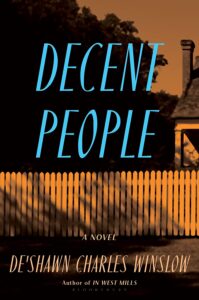
De’Shawn Charles Winslow, Decent People
Bloomsbury, January 17
Winslow, author of the Center for Fiction First Novel Prize winning novel In West Mills, brings us back to West Mills, North Carolina in Decent People. This time, the action takes place in 1976, when three siblings are found shot to death in the still-segregated small town. The white cops are no help, but luckily Josephine Wright has just moved back home, and she’s determined to find out the truth—and a lot of other things besides. –ET
Graham Rayman and Reuven Blau, Rikers: An Oral History
Random House, January 17
Rikers Island is the largest detention center in the United States… and probably its most dysfunctional. In this gripping oral history, covering the 1970s through to the present, journalists Rayman and Blau talk to all the stakeholders in Rikers’ roiling parallel society, from incarcerated people to prison officers to their intermediaries in the legal system. The picture formed from these multivocal testimonies is not a pretty one, and provides further evidence of the dire need for carceral reform in America. –JD

Iliana Regan, Fieldwork: A Forager’s Memoir
Agate, January 24
When lliana Regan left Chicago—where she’d earned a Michelin star as a chef—to start a restaurant and inn in Michigan’s Upper Peninsula, she couldn’t have known she was embarking on a journey back to her childhood on an Indiana farm, and back further still to the stories of her great-grandmother foraging in the wilds of northern Poland. But this is what happens when you head to the woods. Equal parts naturalist, chef, and memoirist, Regan offers readers a candid account of how she found herself in the deepest parts of the northern forest, revelations of self appearing like morels after rain. –JD
Patricia Engel, The Faraway World
Avid Reader Press, January 24
Patricia Engel (Infinite Country, The Veins of the Ocean) is back this year with a powerful new story collection that captures the diasporic experience of the modern Americas in all its complexity, nuance, and humanity. Her characters move across borders and between identities, carrying with them the joys and pains of past lives, and always doing their level best to make a new go of it, whatever that may mean. Her stories also move between registers – at times sweeping and tinged with history, other times intensely personal. Always, her characters are real people, dealing with real struggles, rendered beautifully, with insight and understanding. –Dwyer Murphy, CrimeReads Editor-in-Chief
David Graeber, Pirate Enlightenment, or the Real Libertalia
FSG, January 24
I still can’t get over the 2020 death of David Graeber, who is exactly the kind of aggressively elastic thinker we need to confront these omnivorously bleak times. Best described as an anarchist anthropologist, if one was forced to simplify Graeber’s worldview it’s that people make the world they live in: we make choices about justice and injustice, fairness and iniquity, and we make them together. Like… Pirates! Yes, pirates. Pirate Enlightenment is based on Graeber’s graduate study of life in Madagascar, and Malagasy history, which includes a serious strain of pirate culture, particularly among the Zana-Malata of the 18th century, who practiced a version of libertarian direct democracy. Doesn’t sound too bad, these days… –JD
Selby Wynn Schwartz, After Sappho
Liveright, January 24
I can’t wait to get my hands on this debut novel, full of what author Selby Wynn Schwartz calls “speculative biographies” of real-life women from the late 19th and early 20th centuries (Sarah Bernhardt, Virginia Woolf, Lina Poletti, Josephine Baker, Colette—the list goes on), all fighting for control over their lives. Longlisted for the Booker Prize, After Sappho is composed of vignettes and occasionally breaks into a collective chorus that feels painfully relevant for 2023: “What did we want? To begin with, we wanted what half the population had got by just being born.” –ES
Aleksandar Hemon, The World and All That It Holds
MCD, January 24
I’ve loved Aleksandar Hemon’s writing for about fifteen years now, ever since I picked up his dazzling 2008 sophomore novel The Lazarus Project. I consider his 2013 essay collection, The Book of My Lives, to be one of the most brilliant and devastating works of its kind. All that to say, the publication of a new Hemon novel is, for me, a capital E event. The World and All That It Holds (which I will finally be able to read in T-minus one month) is the story of a young Bosnian Jew who, in the wake of Franz Ferdinand’s assassination, is drafted into the army and falls in love with a fellow soldier. Together, the two men embark upon an epic, decades- and continents-spanning adventure. –DS
Sheila Liming, Hanging Out: The Radical Power of Killing Time
Melville House, January 24
More books about hanging out, less about productivity please. Sheila Liming sees the gap in our thinking about time, and the true worth in spending it in an unstructured fashion with members of our community; she believes that play is to children what “hanging out” is to adults. It’s true that the most intimate friendships I’ve built have been in settings where passing downtime together is a given, such as college dorms, summer cabins, settings where often there simply isn’t another place to be. Spending that time together, rather than alone, or on our phones, is invaluable to the true bonds of intimacy, and it’s high time we recognize it as such instead of believing there is something “more productive” we are supposed to be achieving with our one wild and precious life. –JH
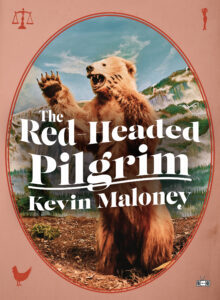
Kevin Maloney, The Red-Headed Pilgrim
Two Dollar Radio, January 24
Kevin Maloney is always good for a laugh, a wrench, and a rollercoaster ride—in his latest novel, which Chelsea Martin calls “a beautiful ode to being a fucked up pathetic virgin” (amazing) a web developer named Kevin Maloney recalls the teenage suburban psychological break/awakening that led him on a long journey to a complicated adulthood. I expect a very good trip. –ET
Martin Riker, The Guest Lecture
Grove Press/Black Cat, January 24
Martin Riker’s The Guest Lecture is like Ducks, Newburyport meets The Good Place meets The Chair, which is to say it’s an incredible book that you need to read right now. Quietly, in a hotel room with her husband and daughter sound asleep next to her, Abby is preparing for a talk she’s supposed to give the next day about John Maynard Keynes, economics, and optimism. She’s woefully unprepared. (Ah, a relatable character!) If she’s being honest, she’s also struggling to find that silver lining, that glass half-full: she was denied tenure, and America isn’t quite shaping up to be the place she wants to raise her daughter in. To rehearse for her lecture, she is using a kind of mind palace: the old trick of going through the rooms of your house and putting parts of your speech in each one. She’s also talking to the John Maynard Keynes of her imagination; he’s trying to keep her on track.
Of course, what follows is a bunch of gleeful tangents, diversions, deep dives into Abby’s past, and one Alice-in-Wonderland-inspired fever dream of a courtroom scene. There’s something so delightfully playful about this novel, about its willingness to explore the corners of the mind and to follow the firing synapses of imagination. While we fall down the rabbit hole, we are also to remember that this entire novel takes place in a single night, as Abby tries to lay still and not wake anyone. There is an intentional claustrophobia to this conceit, one that brilliantly highlights the stagnant state a lot of us find ourselves in, and there is an inherent and propulsive panic to the narrative, too, as we march towards morning. The Guest Lecture boldly asks: how can we hold hope for our tomorrow? –KY
Lydia Sandgren, tr. Agnes Broomé, Collected Works
Astra House, January 31
This is the 600-page Swedish debut novel I will be pressing into everyone’s hands this spring. Don’t be alarmed! The pages frankly fly by—in fact, I wish there were more. It’s the story of all the people left behind after one beautiful, brilliant, and enigmatic woman disappears—her husband Martin, a publisher in Gothenberg, their friend Gustav, a famous painter whose works so often feature her face, and her daughter Rakel, who may or may not have discovered a clue that might lead to her mother’s whereabouts. This is a big, compelling family drama that’s also a mystery, and also a treatise on art and artmaking and friendship and getting older, and it will suck you in and refuse to let go. –ET
Delia Cai, Central Places
Ballantine, January 31
Can you ever really go home again? Delia Cai (of Vanity Fair, also of Twitter) poses this question of her high-flier protagonist, Audrey, who fled her small hometown in Illinois long ago for the dream and promise of New York City. Now Audrey is engaged, and her fiance Ben has requested to visit the hometown she said goodbye to years ago and all that it holds: her domineering mother, quiet father, friends that have rooted and remained in Illinois, and an old crush that knew and understood her way back when. Audrey must come to terms with who and what she left behind, reacquainting herself with her family and her ideas of them, and most of all, she must re-meet a version of herself she thought she’d seen the last of, a version of herself that may be truer than who she is now. –JH
FEBRUARY
Stephen Graham Jones, Don’t Fear the Reaper
Saga, February 7
Stephen Graham Jones blew me away with the first in his Indian Lake trilogy, My Heart is a Chainsaw, and Don’t Fear the Reaper is, if you can believe it, even better than the first! Jade is back, now in her 20s, as a killer and a snowstorm converge on the town of Proofrock and another massacre looms. Can Jade stop the serial killer Dark Mill South before he finishes taking vengeance for 38 Lakota men killed in the 19th century? The fast-paced novel takes place over only a day and a half, and you’ll want to read it just as fast. –MO
Charmaine Craig, My Nemesis
Grove Press, February 7
I’m highly intrigued by the premise of this novel. Tessa and Charlie’s friendship is built on the intellectual exchange of ideas (and maybe more?). They’re both married to other people: Tessa to Milton, and Charlie to Wah, whose traditional femininity Tessa doesn’t understand, and in fact abhors—she calls Wah “an insult to womankind,” and fallout ensues. I imagine that Craig, whose novel Miss Burma was longlisted for the National Book Award, has a lot to say here about feminism and solidarity, race, envy, and more. –ES
Salman Rushdie, Victory City
Random House, February 7
One can only hope Salman Rushdie continues to recover, in whatever form that takes, from the horrific attack he suffered this past year; he is, without a doubt, one of the greatest novelists of his generation. In what sounds like a return to the fantastical maximalism of his early career novels, Victory City is the (literally, classically) epic story of a divinely wrought city and the woman at its heart, whose centuries-long life is intertwined in the rise and fall of all those who make Victory City their home. –JD
Carmela Ciuraru, Lives of the Wives: Five Literary Marriages
Harper, February 7
The HarperCollins Union has been on strike since November 10, 2022. Literary Hub stands in solidarity with the union. Please consider donating to the strike fund.
I’m a sucker for any book about the wives of famous literary men (Z, The Paris Wife, to name a few), so a biography that sets out to tell only these stories is one I will devour. It’s an impressive project, the recovering of stories that are lost to time, or lost in the shadows of the imposing men they were married to. This specific biography focuses on five literary marriages, including Roald Dahl and Patricia Neal, and Kingsley Amis and Elizabeth Jane Howard, among others. The fact that I am only familiar with the names of the husbands in each marriage only goes to show how necessary books like these are. The Lives of the Wives guarantees to be a little gossipy, a little educational, and a vital revisionist history of these men and women. –JH
Dizz Tate, Brutes
Catapult, February 7
Told by a Greek chorus of neighborhood adolescent girls, Dizz Tate’s Brutes recounts the disappearance, and legend, of Sammy, preacher’s daughter, Eddie’s girlfriend, and now-vanished symbol of small-town glamour. They didn’t know her well before she was gone, but the group girls narrating the story are determined the find the truth of what made her leave, even if their innocence too vanishes along the way. –MO
Martin Puchner, Culture: The Story of Us, from Cave Art to K-Pop
W.W. Norton, February 7
Why do we make art? Why do we tell stories? What is it about humanity that just has to build a pyramid or write a concerto or spray paint the side of a subway car? With Culture, professor and public intellectual Martin Puchner attempts to answer these questions—along with a seemingly infinite array of others—as he takes the reader through millennia of human creation, always wondering what’s at the heart of our need to achieve. –JD
Dan Jones, Essex Dogs
Viking, February 7
Dan Jones, the New York Times bestselling historian and the writer and presenter of Secrets of Great British Castles, makes his fiction debut with this novel set during the Hundred Years’ War, and featuring the titular Essex Dogs: “an unruly platoon of archers and men-at-arms led by a battle-scarred captain whose best days are behind him.” Sounds like a TV show in the making. –ET
Mariana Enriquez, tr. Megan McDowell, Our Share of Night
Hogarth, February 7
What a strange and luminous novel. Mariana Enriquez stunned with her collection The Dangers of Smoking in Bed, and Our Share of Night is just as fantastic (and fantastical). Beginning in Argentina in the years of the dictatorship, Our Share of Night follows a father and son on a grief-driven road trip as they mourn the loss of the woman who united them, her dangerous (and possibly immortal) family close in pursuit. A dark vampiric noir that heralds a new era in South American horror. –MO
Kira Yarmysh, tr. Arch Tait, The Incredible Events in Women’s Cell Number 3
Grove Press, February 7
Debut novelist Kira Yarmysh has been Russian opposition leader Alexei Navalny’s press secretary since 2014, for which she’s been arrested several times and spent a month in prison. (She currently lives abroad in exile.) The Incredible Events in Women’s Cell Number 3 follows a young woman named Anya who’s arrested at an anti-corruption rally in Moscow and sentenced to ten days at a special detention center, where she and her cellmates, five Russian women from all walks of life, talk away the long hours. The phrase “essential reading” seems especially apt for this one. –ES
Cherie Dimaline, VenCo
William Morrow, February 7
The HarperCollins Union has been on strike since November 10, 2022. Literary Hub stands in solidarity with the union. Please consider donating to the strike fund.
If you loved the third season of American Horror Story, or just rode the wave of new witch books out this past year, then VenCo is for you! A millennial Metis woman finds a tarnished silver spoon in her wall that allows her to access indigenous magic and connects her to a host of witches hiding in plain sight. –MO
Jen Beagin, Big Swiss
Scribner, February 7
I mean, first of all, who can ignore that cover? Secondly, I’m getting big Moshfeghian vibes from the setup: Greta, who lives in a bee-filled 18th-century Dutch farmhouse in Hudson, New York, and makes her living transcribing sessions for a sex therapist, falls in love with a client she lovingly calls Big Swiss—whom she later encounters and begins an affair with, under a false identity. Thirdly, Jodie Comer has already signed on to play Big Swiss in the HBO series adaptation. So yeah, you could say I’M ANTICIPATING. –ES
Margaret Verble, Stealing
Mariner, February 7
A young Cherokee girl is ripped from her family and forced to endure terrible acts at a religious school bent on destroying her identity and connection to her people. While she resists by keeping her sense of self, the girl also tries to discover the truth behind why the state ripped her away from her father, and who in their small town wanted her gone. –MO
Jennifer Savran Kelly, Endpapers
Algonquin, February 7
A literary mystery perfect for the bookish crowd, Endpapers features a genderqueer book conservator unhappy in the gap between her sense of self and the life she lives. When she goes searching for the owner of a love letter she finds tucked in the pages of an ancient lesbian pulp paperback, she also goes in quest of the answer to a lifelong question: how to live an authentic representation of self. –MO
Daisy Alpert Florin, My Last Innocent Year
Henry Holt, February 14
In Florin’s debit novel, a Jewish college girl attempts to shed her working-class, Lower East Side roots while navigating a relationship with an older, married writing professor. A campus novel set in the late-nineties at New England college campus and a forbidden, ill-fated affair? Count me in. –EF
Nazli Koca, The Applicant
Grove, February 14
Sometimes you encounter a character in a book who you genuinely want to hang out with. We could be friends in real life, you think. Reader, meet Leyla. She’s flunked her thesis, is fighting the subsequent loss of her visa, and works at an Alice-in-Wonderland-themed hostel. She’s biding her time in Berlin until the courts send her back to her family in Turkey. And then one day, she meets a Swedish tourist who has the potential to change her life, if that’s what she decides she wants, that is. Torn between the dream of a creative and artistic life, her grieving family, and whatever future this man can promise, Leyla is a protagonist to root for. As someone who has actually worked at an Alice-in-Wonderland-themed restaurant before, I was particularly tickled by this premise. If you’re picturing the movie, and the tea is saying DRINK ME and the dessert is saying EAT ME, then this book is there saying READ ME. –KY
Richard Bausch, Playhouse
Knopf, February 14
The latest novel from the widely anthologized, certified writer’s writer Richard Bausch brings us to the Shakespeare Theater of Memphis, whose production of King Lear seems to be riddled with scandalous potholes. I love theater novels, and I love Bausch, which gives me high hopes for this one. –ET
Paz Pardo, The Shamshine Blind
Atria, February 14
This one’s got a cool premise—what if Argentina won the Falklands War using weaponized emotions, and the US, now a second-rate has-been, developed a strong illicit market in emotion-inducing drugs that are now in danger of influencing elections? And what if a “Latinx Sam Spade” (as the publicity material calls him) was investigating all this while providing wry social commentary? It’s difficult to find an alternative-history novel that is both this wacky and this believable. –MO
Fiona McFarlane, The Sun Walks Down
FSG, February 14
The latest novel from the author of The Night Guest is a lyrical, polyphonic story set in the Australian outback in 1883. A six-year-old boy goes missing in a dust storm, and McFarlane peels back the layers of the whole community, showing us how all the many members respond—to the crisis, to each other, and to the mythic, desperate landscape in which they live. –ET
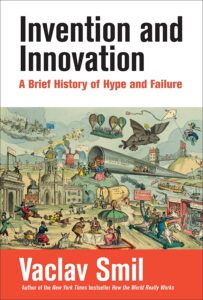
Vaclav Smil, Invention and Innovation: A Brief History of Hype and Failure
MIT Press, February 14
In what is essentially a history of invention (and therefore, in many ways, a history of civilization) Smil reminds us that human beings tend to fail a lot more than they succeed. And yet we are forever striving after better ways to do things, straining toward some perfectible society that no single generation will ever reach. Though Smil warns against our seemingly innate compulsion to overpromise, he also celebrates our capacity for collective innovation, and recognizes we’re going to need a lot of good ideas to get us out of the 21st century. –JD
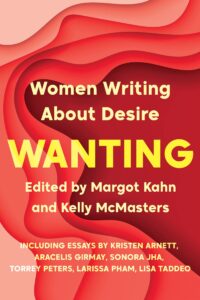
Margot Kahn and Kelly McMasters (eds.), Wanting: Women Writing About Desire
Catapult, February 14
Margot Kahn and Kelly McMaster’s 2017 anthology, This Is the Place: Women Writing About Home, is one of my favorites, so I’m thrilled to dig in to their latest. Featuring some of my favorite contemporary writers (Melissa Febos, Torrey Peters, Camille T. Dungy, Larissa Pham, Karen Russell, to name only a few!), Wanting is about all kinds of longing—from a pair of cowboy boots to a redo at life. –ES
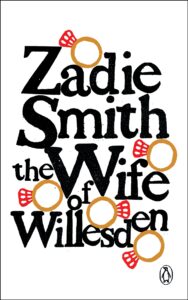
Zadie Smith, The Wife of Willesden
Penguin Press, February 14
“New Zadie Smith” is generally reason enough for anticipation. Throw in the fact that in this, her stage-writing debut, Smith translates Chaucer’s “The Wife of Bath’s Tale” for the 21st century, featuring Alvita, a Jamaican-born British woman with five marriages under her belt, as the titular wife, and I’m officially hooked. (And a PSA for anyone in the US who’s set on seeing a stage performance: The Wife of Willesden is coming to BAM in April.) –JG
Malcolm Harris, Palo Alto: A History of California, Capitalism, and the World
Little, Brown, February 14
In what’s billed as the “first comprehensive history of Silicon Valley,” Harris takes us back to the origins of northern California’s tech ascendancy. From 19th-century railroad barons to the counterculture capitalists of the 1970s, Harris tells a story of wanton hubris and curdled idealism, one that seeks to account for the global rise—in tech, in war, in capitalism—of an otherwise forgettably pleasant suburb of San Jose. –JD
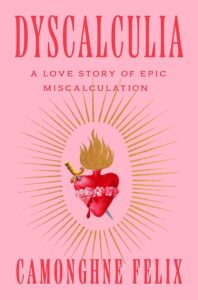
Camonghne Felix, Dyscalculia: A Love Story of Epic Miscalculation
One World, February 14
I’ve long been a fan of Camonghne Felix’s cultural criticism and poetry (her 2019 collection, Build Yourself a Boat, was longlisted for the National Book Award), so I’m thrilled that she’s gifting us with a memoir this year. Using her childhood dyscalculia as a metaphor, Felix delves into heartbreak and healing from childhood trauma. If you’re into poetic, rigorous personal narratives (think Elissa Washuta and Ocean Vuong), you’ll want this one on your list. –ES
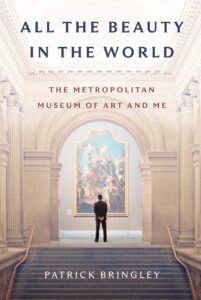
Patrick Bringley, All the Beauty in the World: The Metropolitan Museum of Art and Me
Simon & Schuster, February 14
New Yorkers and art lovers, prepare to be wooed by this memoir, which doubles as a loving portrait of the Met from one of its most inside insiders: Patrick Bringley, who worked at the museum as a guard for a decade. Time to plan a trip! –ET
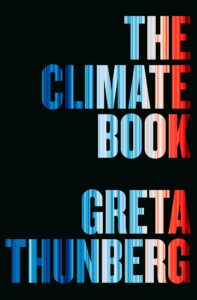
Greta Thunberg, The Climate Book
Penguin, February 14
The (still teenage!) Swedish environmental activist has gathered the wisdom of over one hundred climate experts—from geophysicists and oceanographers to economists and mathematicians, historians and engineers to philosophers and indigenous leaders—in order to “equip us all with the knowledge we need to combat climate disaster.” Alongside these expert opinions, Thunberg shares her own experiences documenting and uncovering greenwashing across the world. Thunberg is one of the most genuinely inspirational figures in public life today, and I’m excited to finally sit down with one of her books. –DS
Sonora Jha, The Laughter
HarperVia, February 14
The HarperCollins Union has been on strike since November 10, 2022. Literary Hub stands in solidarity with the union. Please consider donating to the strike fund.
In which a college professor (our narrator, Dr. Oliver Harding, naturally white and male, English department) becomes dangerously obsessed with his new colleague (Ruhaba Khan, Pakistani and female, Law), and all—the good and the terribly, terribly frightening—that she represents. Mat Johnson writes that the novel “takes the old suffocating male narcissist of Coetzee’s Disgrace and Nabokov’s Lolita and gives him new, previously unexplored dimension with a modern dissection of the Whiteness at his core.” Just my kind of book. –ET
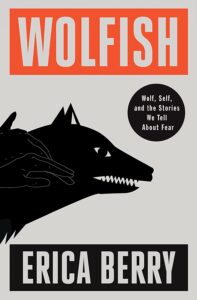
Erica Berry, Wolfish: Wolf, Self, and the Stories We Tell About Fear
Flatiron, February 21
Erica Berry’s debut, a cultural legacy of the wolf, is a “kaleidoscopic exploration of wolves, both real and symbolic.” In the vein of H is for Hawk (e.g., what can an animal teach us about the writer and the human condition at large), Berry explores the life of legendary tagged wolf, OR-7. Alongside her own coming-of-age story, she unpacks our understanding of fear, danger, and the body. –EF
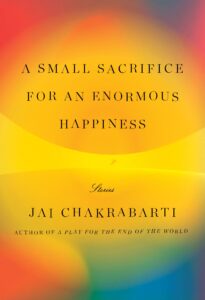
Jai Chakrabarti, A Small Sacrifice for an Enormous Happiness
Knopf, February 21
In these fourteen short stories about families and how to make them, Qian Julie Wang writes, “Chakrabarti brilliantly illuminates the moments—big and small—that define our shared humanity. Poignant, incandescent, and unforgettable.” Sounds like just what we need right now. –ET

Nona Fernández, tr. Natasha Wimmer, Voyager: Constellations of Memory
Graywolf, February 21
As a fan of Nona Fernández’s Space Invaders and The Twilight Zone, I’m just along for the ride. In the case of Voyager, the first stop is to the doctor, where Nona Fernández seeks an explanation for her mother’s falling spells and memory loss. If you’ve read her other books, you know that she is an expert at weaving seemingly disparate topics together, at finding their common threads. In this personal essay, she draws inspiration from the titular Voyager spacecrafts, leading us through outer space and internal medicine. (I’m reminded of that image that went around the internet some time ago, of two images side-by-side; one was a photo of the brain, and the other was an image of the universe, and they were nearly interchangeable.) Wherever this great writer (and translator!) wants to take us, I’m there. –KY
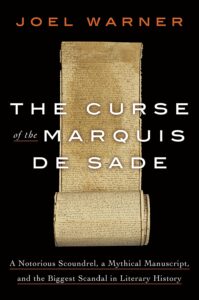
Joel Warner, The Curse of the Marquis de Sade: A Notorious Scoundrel, a Mythical Manuscript, and the Biggest Scandal in Literary History
Crown, February 21
I feel like the title of this one…kinda sums it up? Like, if you don’t want to read this book, what are you even doing on this site. And as a side note, I have already successfully pushed this book upon my coworkers by saying virtually the same thing. –MO
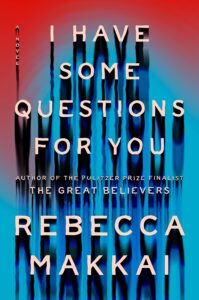
Rebecca Makkai, I Have Some Questions For You
Viking, February 21
Rebecca Makkai’s last novel, The Great Believers, a brilliant novel about friendship and family during the 1980s AIDS crisis in Chicago, was a finalist for both the Pulitzer Prize and the National Book Award. Her new book is a boarding school mystery that ticks all the right boxes. Bodie Kane, a filmmaker and podcaster, is invited to teach a class at her New Hampshire boarding school, The Granby School. The 1995 murder of her classmate, Thalia Keith, and the conviction of the school’s athletic trainer, Omar Evans, begin to weigh heavily on her mind—and real, worrying questions about the conviction, the police, and the school take shape. It’s two parts a true-crime who-done-it page turner, and one part condemnation of our justice and mass incarceration system—a must read. –EF
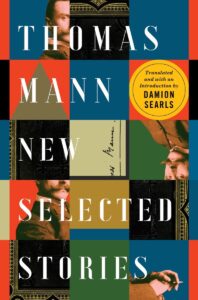
Thomas Mann, tr. Damion Searls, Thomas Mann: New Selected Stories
Liveright, February 28
I devoured the stories of Thomas Mann in my twenties; sadly (joyously?) that represents a long enough gap in years that I may truly be able to discover them anew in this fresh translation by the brilliant Damion Searls. “Death in Venice” as if for the first time? Yes please. –JD

Priya Guns, Your Driver is Waiting
Doubleday, February 28
Honestly, you had me at “queer feminist reboot of the iconic 1970s film Taxi Driver.” Starring Damani, who drives for a ride sharing app in a city full of protests, and who meets a beautiful, rich white girl—which is of course, the moment things start to go wrong. –ET
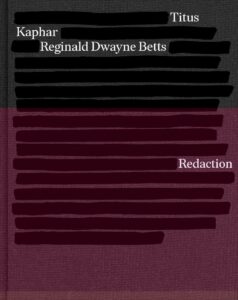
Reginald Dwayne Betts, Titus Kaphar, Redaction
W.W. Norton, February 28
A collaborative work between visual artist and filmmaker Titus Kaphar and poet, memoirist, and attorney Reginald Dwayne Betts, Redaction is a collection of prints first exhibited at MoMA PS1, layering Kaphar’s portraits of incarcerated people with Betts’ poetry to create a body of work about the abuses of the criminal justice system. I’m familiar with the power and beauty of Betts’ writing on the subject, so I have no doubt this collection will be stunning. –JG
MARCH
Eleanor Catton, Birnam Wood
FSG, March 7
This is a psychological thriller about gardening. Yes, that’s right: Guerrilla gardeners who call their group Birnam Wood! An enigmatic billionaire supposedly building an end-times bunker! A town cut off from the rest of the world! From the author of the mesmerizing, Booker Prize-winning The Luminaries! I cannot wait to read it. –ET
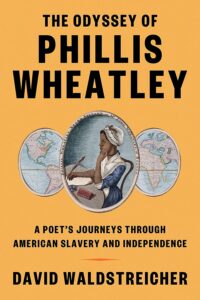
David Waldstreicher, The Odyssey of Phillis Wheatley: A Poet’s Journeys Through American Slavery and Independence
FSG, March 7
If anyone needed further proof that the incredible life of Phillis Wheatley deserves its own blockbuster prestige TV series they need look no further than David Waldstreicher’s 500-page biography. Kidnapped as a child from West Africa and forced into slavery in Boston, Wheatley soon displayed an uncanny talent for languages, writing poetry and polemics that would see publication in New York, Boston, and as far away as London. And not just pretty verse—Wheatley didn’t shy away from the politics of the day, no matter how contentious, earning the praise of George Washington (and scorn of Thomas Jefferson). –JD
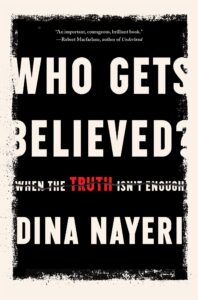
Dina Nayeri, Who Gets Believed?: When the Truth Isn’t Enough
Catapult, March 7
Dina Nayeri’s previous book, The Ungrateful Refugee, was a vital work about the refugee experience. She wove her own story of fleeing Iran with those of other refugees and asylum seekers to create a work of great complexity and humanity. In Who Gets Believed?: When the Truth Isn’t Enough, Nayeri turns her keen eye to issues of honesty and persuasion, through her own stories and those of others, including asylum seekers, exonerated felons, and others whose lives have been shaped by questions of belief and credibility. Robert McFarlane calls it “an important, courageous, brilliant book… a form-shifting memoir of an already-remarkable life, and a moving, harrowing investigation of love, loss and care.” –JG

Jonathan Healey, The Blazing World: A New History of Revolutionary England, 1603-1689
Knopf, March 7
Yes, I am unreasonably excited about this 500-page history of 17th-century England, an era of plots and revolutions and uprisings that presaged the emancipatory shockwaves of the next few hundred years. From the Gunpowder Plot to the Civil War to the radical dissent of movements like the Diggers, the chaos and drama of England’s 17th-century is as entertaining as it is enlightening about the origins of the modern West. I am ready. –JD
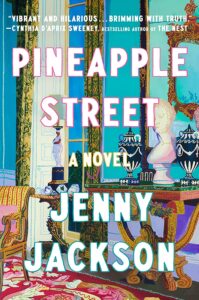
Jenny Jackson, Pineapple Street
Pamela Dorman, March 7
You can’t get any better than Pineapple Street’s marketing copy: “a smart, escapist novel that sparkles with wit.” Sign me up a million times over; it knows what the people want! The novel revolves around three female members of a wealthy Brooklyn family and their choices to either marry into the family, remain within its bubble, or leave it and its privilege behind. As an editor herself, Jenny Jackson is well aware of the demand for voyeuristic, lively novels about the uber-wealthy, one that toes the line between awareness and ignorance, allowing the reader to both identify with and other the characters—think White Lotus, or any recent wildly popular piece of entertainment that follows this trend. We’ll laugh, we’ll cringe, we’ll live vicariously. After years spent working on other people’s books, it’s high time for Jackson’s own work to get the spotlight. –JH
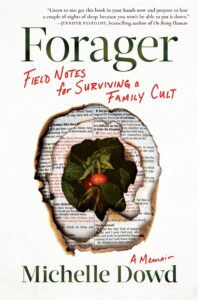
Michelle Dowd, Forager: Field Notes for Surviving a Family Cult
Algonquin, March 7
Michelle Dowd grew up as a third-generation member of a cult called the Field, started by her grandfather atop a mountain in Angeles National Forest (just 100 miles outside of LA). Dowd’s grandfather believed he’d live to be 500, or at least until Doomsday, and as any divinely adjacent patriarch would, he gathered his followers to him and made a home in the wilderness. As Dowd recounts in Forager, she grew up learning all the rough skills required of such a life, but little did she know she was also growing the strength to eventually escape the life she was born into. –JD
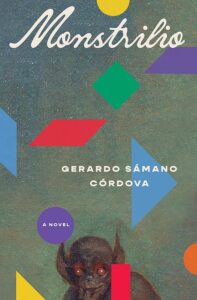
Gerardo Sámano Córdova, Monstrilio
Zando, March 7
Part of a new wave of haunted house horror that continues to expand and redefine the genre, Monstrilio is about a woman who creates a monster from a piece of her dead son’s lung, feeding it bloody sacrifices as it grows into the image of her long-gone child. Her monstrilio is loved, cared for, and wholly monstrous. But are not the monsters among us also capable (and deserving) of love? Read this if you liked Sarah Gailey’s Just Like Home! –MO
Alexander Nemerov, The Forest: A Fable of America in the 1830s
Princeton University Press, March 7
This is may be vain, and definitely cringey, but I really wish I’d written this book. The Forest is what one might dubiously call “a nonfiction novel,” taking as it does the lives, both real and imagined, of multiple early inhabitants of America’s great forests—artists, tradesmen, farmers, poets, enslaved people—and turning them into fictionalized episodes. No matter their station in life, the characters in The Forest—Nat Turner, Nathaniel Hawthorne, Thomas Cole—move through and rely on the woods, for shelter, for fuel, for just about everything. This is history imagined as ecology. –JD
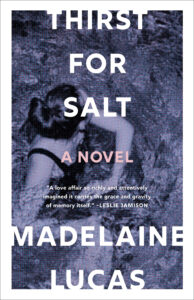
Madelaine Lucas, Thirst for Salt
Tin House, March 7
Lucas is a wonderful writer and I’m looking forward to her debut novel where a woman, finding herself aimless after college in an isolated Australian coastal town with her drifter mother, is drawn into a love affair with an older local man, Jude. “It’s hard to remember now that I was once that girl, lying in the sand in my red swimsuit and swimming late into the day. Sharkbait, he called me.” Told from the perspective of many years later, new questions take shape, unraveling a nostalgic narrative about the summer that shaped her, and the woman she had wanted to become. –EF
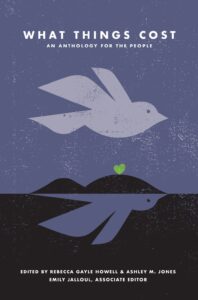
Rebecca Gayle Howell, Ashley M. Jones, Emily J Jalloul (eds.), What Things Cost: An Anthology for the People
University Press of Kentucky, March 7
Another anthology on my list this year is What Things Cost, which collects over 100 contemporary writers musing on labor and solidarity, disenfranchisement and dignity. Featuring the likes of Natalie Diaz, Ocean Vuong, Victoria Chang, and Jericho Brown, it promises to be a major contribution to one of the most significant movements of our time. –ES
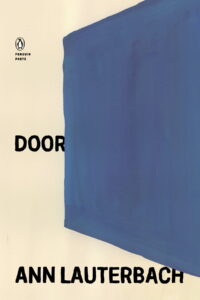
Ann Lauterbach, Door
Penguin Books, March 7
The eleventh collection from Ann Lauterbach, whose Or to Begin Again was a finalist for the 2009 National Book Award in poetry, takes—as its title would indicate—the threshold as motif, investigating the relationship “between the inner landscape of memory, thought, imagination and dream and the outer so-called real world, which increasingly comes to us through technology’s lens, displacing and distorting our sense of intimacy, presence and relation.” –ET
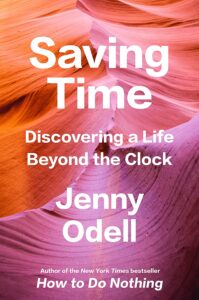
Jenny Odell, Saving Time: Discovering a Life Beyond the Clock
Random House, March 7
Odell’s New York Times bestseller How to Do Nothing was a wonderfully subversive book about the “attention economy” and the power of art and our own interiority. In her new book, Odell takes aim at the corporate clock and a world where “time is money.” Exploring waiting and desire in the natural world, “Odell urges us to become stewards of these different rhythms of life, to imagine a life, identity, and source of meaning outside of the world of work and profit.” –EF

Margaret Atwood, Old Babes in the Wood
Doubleday, March 7
Does this one even need an introduction? Margaret Atwood! You know her! She wrote The Handmaid’s Tale and The Blind Assassin and Oryx and Crake. She famously loves electric scooters and flamethrowers. (Writers—they’re just like you!) From this great mind, a new book is born. It’s her first story collection since 2014’s The Stone Mattress. Old Babes in the Wood promises to plumb the depths of folklore and family relationships. In one story, two sisters wrestle with memory; another takes a microscope to a mother-daughter relationship in which the mother claims to be a witch. There’s something that feels out-of-time about these stories, like tales best told around a campfire. Gather around! –KY
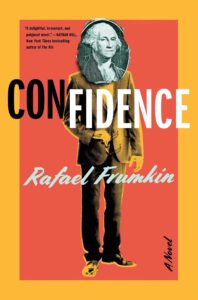
Rafael Frumkin, Confidence
Simon & Schuster, March 7
I’m not narcissistic enough to believe that the Simon & Schuster marketing team wrote the description of Rafael Frumkin’s sophomore novel purely to appeal to me, but if they were trying to get my attention, describing a book as having “the suspense of The Talented Mr. Ripley, the decadence of The Great Gatsby, and the wit of Succession… for anyone who knows that the American Dream is just another pyramid scheme” would be precisely the way to do it. A caper, a queer love story, and a takedown of both wellness culture and the American dream? Sold in the room. –JG
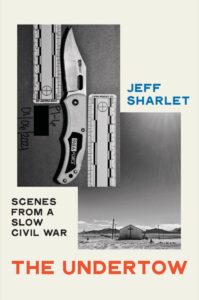
Jeff Sharlet, The Undertow: Scenes from a Slow Civil War
W.W. Norton, March 7
Sharlet’s books require the kind of reportage that feels both immersive and terrifying—his work takes him deep into uncomfortable territory, holding a mirror up to the world we think we live in to reveal another place altogether. That’s what The Undertow promises: a deep dive into the religious dimensions—and fanaticism—of American politics. From a conference for incels to the celebrated martyrdom of a Capitol rioter, Sharlet’s new book will be a must read for everyone looking to understand how the country got to where we are. –EF
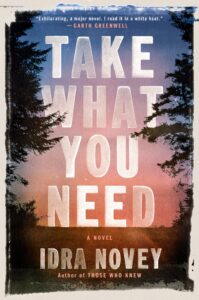
Idra Novey, Take What You Need
Viking, March 14
Idra Novey has a knack for that one specific image. The one you can’t get out of your head, the one that hooks you. In her first novel, Ways to Disappear, that image was of a 60-year-old author climbing a tree and disappearing altogether. In her new novel, Take What You Need, that image will probably be the giant sculptures that our protagonist finds when she comes to clean out her recently deceased stepmother’s house. Leah knew it would be difficult to return to the rural Appalachia she fled, but what she wasn’t expecting to encounter was her beloved (but estranged) stepmother’s art, made with welded metal scraps from the area’s industrial history. In this touching new work, Idra Novey asks questions about how we might contend with our ghosts and how we might repurpose our past. –KY
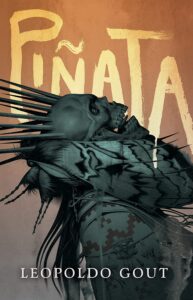
Leopoldo Gout, Piñata
Tor Nightfire, March 14
This stunningly crafted possession novel is rooted in Aztec history and Nahua religious practice, with an ancient Aztec vessel as the conduit for a powerful spirit seeking to avenge the victims of colonialism. Piñata follows an architect and her two daughters, first in Mexico City, then in New York City, pursued by the spirit all the while, as Gout examines the classic possession tale—an adolescent girl, given powers through her liminal state—and reframes it as a response to racism and the erasure of history and culture. –MO
Regan Penaluna, How to Think Like a Woman: Four Women Philosophers Who Taught Me How to Love the Life of the Mind
Grove Press, March 14
Where were all the women philosophers, Regan Penaluna wondered, and what would the field of philosophy look like if women practitioners were treated equally? This book is Penaluna’s response to her own experience of misogyny in American academia. A blend of memoir, criticism, and the biographies of four women who contributed to the field and were largely lost to history, How to Think Like a Woman is a much-needed revelation. –ES
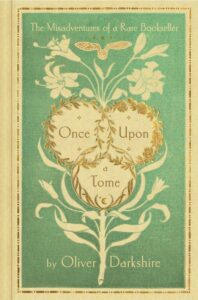
Oliver Darkshire, Once Upon a Tome: The Misadventures of a Rare Bookseller
W.W. Norton, March 14
I once worked with a rare bookseller—a recovering alcoholic who was also a poet—who drank upwards of 20 non-alcoholic beers a day just to take the tiniest of edges off—man, did that guy have stories (none repeatable here). So yes, I’m a sucker for good bookstore yarns, which I expect to find in spades from Oliver Darkshire’s memoir of life at Sotheran’s, one of London’s oldest bookstores, and all the weird, eccentric characters who move through it. –JD
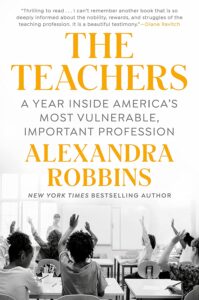
Alexandra Robbins, The Teachers: A Year Inside America’s Most Vulnerable, Important Profession
Dutton, March 14
Let’s be honest, we’ve all had some bad recent years, but not sure anything can hold a candle to what the teacher’s have been through. Society both valorized and demonized them during the pandemic, bowing down to their “essential” work, while also condemning them if they made any move to complain about or criticize the handling of schools during covid. This is, unfortunately, just a dramatization of how they are treated even during a good health year; they are leaned upon, thanked in theory, but ultimately, perpetually expected to go above and beyond with little rightful compensation or understanding of what’s being asked of them. Alexandra Robbins has gone behind the scenes to follow three teachers for a year of their life, revealing the joys and pleasures of the profession, but also the struggles and the fears. We’ll come away from this deep-dive with a true, profound understanding of the labor we take for granted. –JH
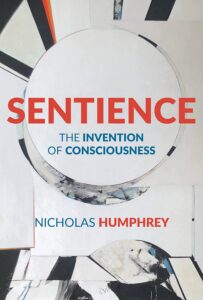
Nicholas Humphrey, Sentience: The Invention of Consciousness
MIT Press, March 14
The history of science has alwyas relied on hard lines and clear categories, and for a long time one of the hardest of those lines was that between sentience and non-sentience. But as theoretical psychologist Nicholas Humphrey explores in Sentience, that line may not be as clear as initially thought, as discoveries in machine-learning, neurobiology, and animal consciousness raise more questions than they answer. –JD
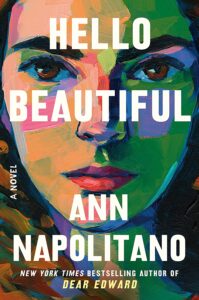
Ann Napolitano, Hello Beautiful
Dial Press, March 14
After her beautiful (and bestselling) novel Dear Edward, about a boy who is the sole survivor of a plane crash, Napolitano returns with another complex family saga, this time an homage to Little Women. William Waters’ home life was marred by tragedy, so when he meets Julia Padavano during his freshman year in college, her spirited nature changes his perspective. What’s more, in her home with her close-knit sisters he finds contentment he wasn’t sure was possible. But tragedy and chaos ensue, and familial rifts threaten everything. Napolitano is a master of examining what binds us to family, what makes family, and how to love in difficult times. –EF
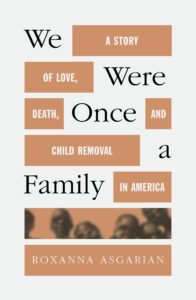
Roxanna Asgarian, We Were Once a Family: A Story of Love, Death, and Child Removal in America
FSG, March 14
If you watched the third season of Atlanta, or just the first episode, you’ll recognize the story of the two white married women who drove themselves and their six Black adopted children off a cliff in 2018. Asgarian’s investigation is an investigation into the chilling case, and ultimately an indictment of the American foster care system, which is just as racist and corrupt as you imagine. –ET
Cathleen Schine, Künstlers in Paradise
Henry Holt, March 14
Set in Los Angeles during the pandemic, but reaching back into 1930s Vienna, Kunstlers in Paradise is a novel of memories. Ninety-three-year old Mamie Kunstler lived alone in her bungalow in LA until her grandson Julian comes to stay: when the pandemic shutdowns begin, they find themselves sheltering together, with time to delve into Mamie’s family history and how her family managed to escape Vienna when the idyllic city turned nightmarish. With glamour and grace, Mamie weaves the tale for Julian, describing the mecca of Jewish artists they lived alongside in sunny California, and the new understanding of home that she and her family came to. Mamie opens up a world of history and also possibility for Julian, allowing him into the shadows of family lore to see it in all its glory and honesty. –JH
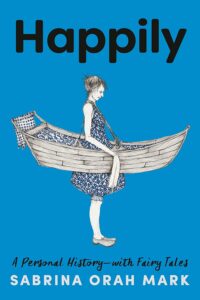
Sabrina Orah Mark, Happily: A Personal History—With Fairy Tales
Random House, March 14
I love Sabrina Orah Mark’s wise gorgeous Paris Review column, so I can’t wait to get my hands on the memoir-in-essays that sprang from it. Happily explores the perpetual relevance of fairy tales to contemporary life. Mark weaves fairy tale logic into stories from her own life to create an insightful examination of both the specific and the universal. In her hands, I look forward to spending time with both the fantastical and the beautifully mundane. –JG
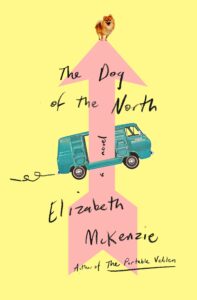
Elizabeth McKenzie, The Dog of the North
Penguin Press, March 14
I was so charmed by McKenzie’s last novel, The Portable Veblen, that in the years since I read it, I’ve periodically googled her to make sure I didn’t miss her next one. At last, the time has come! The Dog of the North, in which Penny Rush, a woman recently marriage-less and jobless, must contend with a mentally unbalanced father, a missing mother, and a mad-scientist of a grandmother (Dr. Pincer!), sounds like it will be every bit as brilliantly daffy as her previous work. I’m of the opinion that we need more screwball comedies in literary fiction, generally, and I’m delighted that McKenzie is doing her part. –JG
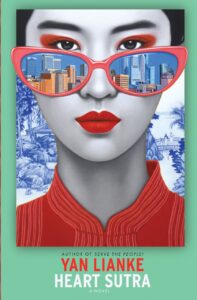
Yan Lianke, tr. Carlos Rojas, Heart Sutra
Grove, March 14
Open up to the first page of any Yan Lianke novel, beautifully translated by Carlos Rojas, and you’ll feel confident that you’re in the hands of an assured and timeless storyteller. There’s always something deeply psychological about his books—like he’s probing at a desperate part of the psyche that most prefer to leave alone. His new novel takes place at a Religious Training Center in Beijing. Disciples of five major religions have gathered for one year of intensive studies. On this hallowed ground, two young disciples (a Buddhist nun and a Daoist master) fall in love. But they’re each harboring their own secrets, private reasons for being there. As these personal desires play out, and as corruption reveals its roots in the institution, our characters will have to grapple with faith—in their studies, in each other, and in themselves—in the face of doubt. And it’s all going to culminate in a tug-of-war contest between the religions. In case it wasn’t obvious, Yan Lianke—in addition to having a wicked imagination—also has a cutting eye for satire. I have faith (sorry) that it’s going to be a good one. –KY
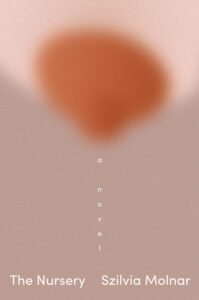
Szilvia Molnar, The Nursery
Pantheon, March 14
In the “maternal prison of her apartment,” a new mother copes with the dizzying dissatisfaction of postpartum life. One of the joys of reading The Nursery goes beyond recognizing these moments and feelings from my own time with newborns—although seeing that in a book is exciting enough—and includes the sentence-level beauty of the tiniest, private moments between a mother and child. “Has there ever been a description of a mother holding her child for hours? Has anyone unraveled the little hours? My state might be a portrayal of the elasticity of time.” Molnar writes through the delicate balance of life-as-art and comes out the other side with a brilliant novel. –EF
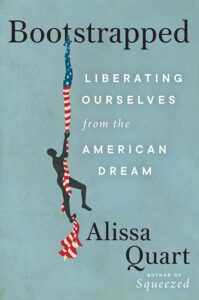
Alissa Quart, Bootstrapped: Liberating Ourselves from the American Dream
Ecco, March 14
The HarperCollins Union has been on strike since November 10, 2022. Literary Hub stands in solidarity with the union. Please consider donating to the strike fund.
Alissa Quart is an essential chronicler of American inequality, and at a moment when the schism between the wealthy and everyone else seems to be getting wider and deeper by the hour, we need her work more than ever. Bootstrapped investigates the American obsession with self-reliance and pulling ourselves up by those titular bootstraps—and the ways in which this myth has dissuaded us from fighting for a social safety net. I look forward not only to reading this one, but also by quoting it in heated conversations for years to come. –JG
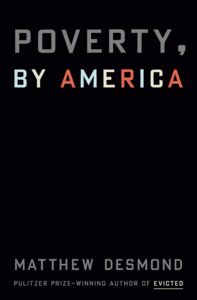
Matthew Desmond, Poverty, by America
Crown, March 21
Desmond’s book about families struggling to pay rent during the 2008 financial crisis, Evicted, absolutely floored me when it was published in 2016 (it also won the Pulitzer). So I am very much anticipating the MacArthur Fellow’s next book, which is about how wealthy Americans benefit from the poverty of their neighbors—and how they work, knowingly or unknowingly, to keep poor people right where they are. This is the kind of awareness we desperately need to start to change this broken, cruel system. –ET
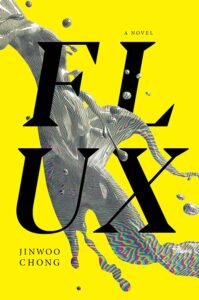
Jinwoo Chong, Flux
Melville House, March 21
Flux is full of surprises and difficult to describe. Three storylines slowly begin to converge into a tale of time-traveling corporate serial killers. Woven into all three stories is a connection to a 1980s detective show featuring a now-canceled star facing damning abuse allegations. If you like stories featuring neo-noir style, corporate corruption, and anything else that wouldn’t be out of place in a slightly more humorous version of the Blade Runner universe, than check this one out! Also notable as an exploration of queer and Asian-American identities. –MO
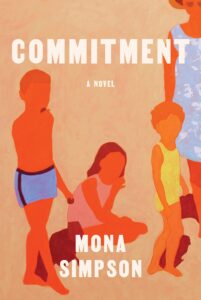
Mona Simpson, Commitment
Knopf, March 21
Nobody writes imperfect parents and fraught family dynamics like Mona Simpson, so her newest novel—which chronicles the struggles of a family after its matriarch, Diane, is sent to a state hospital in 1970s California after a major depressive episode. The novel follows Diane’s three children as they struggle with the fallout from their loss. If it’s anything like Simpson’s other work, this one promises to be brilliant, harsh, merciful, and devastating. –JG
Victor LaValle, Lone Women
One World, March 21
Victor LaValle’s last novel—2017’s urban horror/fantasy The Changeling—was one of the most brilliantly imaginative and genuinely terrifying novels of the last decade. His hotly anticipated follow up, Lone Women, looks to be every bit as eerie and expansive as Apollo Kagwa’s New York odyssey. Set in the early years of the 20th century, Lone Woman follows Adelaide Henry, a young woman with a horrifying secret who, in the wake of her parents’ deaths, flees to Montana to become a homesteader. From Inland to Outer Range, I love a good magical western, so this one will be going right to the top of my TBR pile. –DS
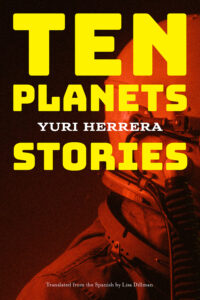
Yuri Herrera, tr. Lisa Dillman, Ten Planets
Graywolf Press, March 21
Signs Preceding the End of the World (also translated by Dillman) was one of my favorite story collections of the previous decade. Herrera’s writing moves through different registers with ease, some familiar, some uncanny: the noir, the metaphysical, the self-aware, the brutal… all of it unlikely and beautiful. In Ten Planets, Herrera shifts from the fantastical (monsters and aliens) to the eerily materialist (a bacterium achieves sentience) like a boy flipping through the pages of a beloved comic book: with delight and conviction. –JD
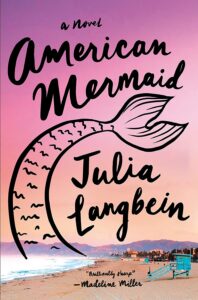
Julia Langbein, American Mermaid
Doubleday, March 21
Julia Langbein’s debut novel, which Madeline Miller calls “brilliantly sharp, funny, and thought-provoking,” tells the story of a broke English teacher whose feminist novel becomes a surprise hit, prompting her to move to L.A. to adapt it for the big screen. Part Hollywood satire, part magical realist myth, this one sounds like the wonderfully strange, extremely funny page-turner of my dreams. –JG

Esther Yi, Y/N
Astra House, March 21
A few months ago, my boyfriend dropped The Paris Review into my lap and said, “You have to read this story.” I’m not always good at following through with these recommendations, so he proceeded to stand there until I did. And, reader, I loved it. The story in question was “Moon” by Esther Yi, which follows a young Korean American woman as she becomes increasingly obsessed with a K-pop group. She starts off skeptical, rolling her eyes whenever her fangirl roommate talks about them with such open love. She is dragged to a concert, where she is, inevitably, converted.
When Esther Yi paints a picture, she does it with bright, bold brushstrokes. Listen to this: “It was the neck that disturbed me. Long and smooth, it implied the snug containment of a fundamental muscle that ran down the body all the way to the groin, where, I imagined, it boldly flipped out as the penis.” What? Don’t you need more of that? Good news: that was only the first few pages of what is sure to be a wild ride of a novel. Our unnamed narrator starts to write fanfiction, placing you, dear reader directly into the action. When her favorite musician, Moon, suddenly retires, she journeys to Seoul to find him—and maybe herself in the process. (What are our earnest obsessions, after all, if not some sort of mirror into ourselves?) Please take this blurb as me dropping this story/upcoming book in front of you with similar urgency. –KY
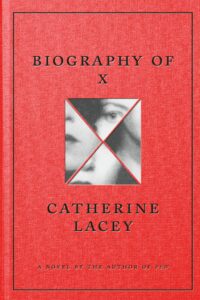
Catherine Lacey, Biography of X
FSG, March 21
Catherine Lacey (The Answers, Pew) is one of our most innovative contemporary authors and her new novel, Biography of X, sounds like her most ambitious and intriguing work yet. When X, a mysterious and iconoclastic artist in an alternate US, falls dead in her office, her grieving widow, CM, sets out to write the biography of the woman she adored and idolized. To understand her late partner, she must immerse herself in the history of the Southern Territory, “a fascist theocracy that split from the rest of the country after World War II, as it is finally, in the present day, forced into an uneasy reunification.” An epic, decades-spanning literary mystery featuring cameos from David Bowie, Tom Waits, Susan Sontag, and Kathy Acker, Biography of X has been described as having “the breadth of a 19th century classic with the propulsiveness of a psychological thriller.” –DS
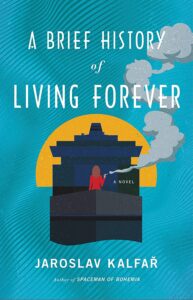
Jaroslav Kalfar, A Brief History of Living Forever
Little, Brown, March 28
From the author of Spaceman of Bohemia, Kalfar’s new novel is a sci-fi/post-apocalyptic family romp where two long-lost siblings must save their mother Adéla from a terminal illness. Adéla had left her native Czech village for America to reunite with her daughter Tereza, the star researcher at VITA, the biotech company working to discover the key to immortality. A thoroughly original story from a writer to watch. –EF
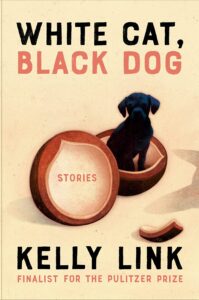
Kelly Link, White Cat, Black Dog: Stories
Random House, March 28
Trying to write this blurb, I keep thinking of A.J. from Empire Records, trying to figure out how to declare his love for Liv Tyler. Say it with me, old millennials: “You know that feeling when you get out of a warm bath . . . well . . . you make me feel like a bath?!?!” Disgust and shame. But this story collection really does feel like a bath, in the sense that it hits all my fairy tale pleasure sensors, and all my novelty pleasure sensors too. (This would be fairly standard for a Kelly Link book, as you probably know.) It’s like a very spicy, kind of scary, whip smart, winking . . . bath. That is, exactly what I want in my life at all times. –ET
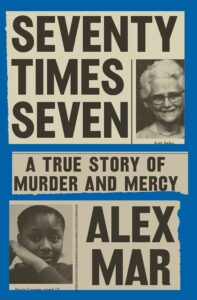
Alex Mar, Seventy Times Seven: A True Story of Murder and Mercy
Penguin Press, March 28
The only way this country will ever free itself of the moral stain that is capital punishment is through stories like the one Mar tells in Seventy Times Seven: of individual compassion and moral courage. In 1985, a Black teenager named Paula Cooper killed an elderly white woman named Ruth Relke, beloved in her hometown of Gary, Indiana. Cooper was given the death sentence, but before she could be murdered by the state, Relke’s grandson Bill very publicly forgave Cooper, setting in motion a campaign to save Cooper’s life that would go all the way to the Vatican. –JD
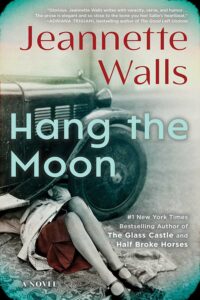
Jeannette Walls, Hang the Moon
Scribner, March 28
Jeannette Walls was, and is, a force to be reckoned with—her memoir The Glass Castle was read by just about everyone and their mother, and was featured on the New York Times bestseller list for eight straight years. While Hang the Moon is a historical fiction novel rather than a memoir, Walls has indisputably positioned herself as a writer of great worth, and any work of hers is one to be appreciated. This one focuses on Sallie Kincaid, a young girl in Virginia during Prohibition, whose mother died when she was young and lives with her father and his new wife and son. The family is rife with secrets, and past and present trauma that Sallie must contend with as she comes into her own as a woman and bootlegger during the dry crusade. –JH
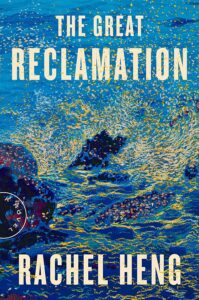
Rachel Heng, The Great Reclamation
Riverhead, March 28
Heng’s novel is an epic love story set against war and colonialism: Ah Boon and Siok Mei live in a coastal-fishing village in Singapore in the waning years of British rule. As they come of age, their lives are intertwined with great sweeps of history—World War II and Japanese occupation. A novel about the tensions of homeland and nationhood, this promises to be a must-read. –EF
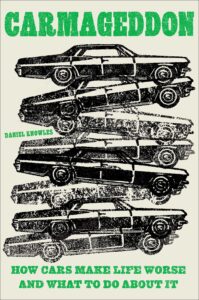
Daniel Knowles, Carmageddon: How Cars Make Life Worse and What to Do About It
Abrams, March 28
As someone who learned to drive at what Americans would consider a disgracefully late age (cough…thirty-two…cough), and who recently spent time attempting to navigate the Ballardian Texas state highway system (which contains a twenty-six-lane freeway), I am excited to read, and nod enthusiastically along with, this anti-car polemic by Economist journalist Daniel Knowles. I’m doing so even as I read the promotional copy: “Over the past century cars have filled the air with toxic pollutants and fueled climate change. Cars have stolen public space and made our cities uglier, dirtier, less useful, and more unequal. Cars have caused tens of millions of deaths and injuries. They have wasted our time and our money.” Hear hear. –DS
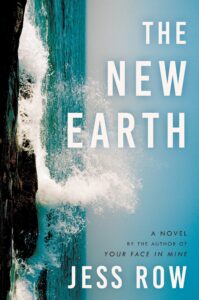
Jess Row, The New Earth
Ecco, March 28
The always-perceptive Jess Row is back with a complex family epic, in which a Jewish clan is torn apart when its patriarch barely dodges disbarment, its matriarch tells her children that her father was Black, and their youngest child is killed by a sniper while protesting the Israeli occupation of Palestine. But years later, when their middle child, Winter, gets married, the whole family must come back together, despite difficulties both personal and political. –ET
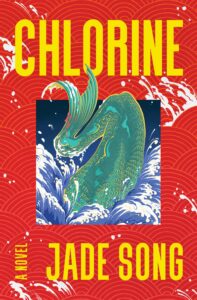
Jade Song, Chlorine
William Morrow, March 28
The HarperCollins Union has been on strike since November 10, 2022. Literary Hub stands in solidarity with the union. Please consider donating to the strike fund.
Jade Song’s debut novel is a coming-of-age story about Ren, a teenage competitive swimmer who will do whatever it takes to become… a mermaid. Drawing comparisons to The Pisces and The Vegetarian, Chlorine is billed as an unsettling sendup of the pressures of girlhood, queerness, and being a first-generation immigrant in America. I can’t wait to see what Song does with this irresistible premise. –ES
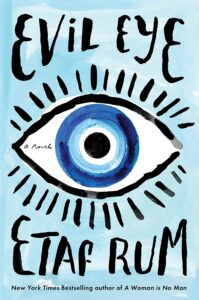
Etaf Rum, Evil Eye
Harper, March 28
The HarperCollins Union has been on strike since November 10, 2022. Literary Hub stands in solidarity with the union. Please consider donating to the strike fund.
The bestselling author of A Woman is No Man is back with a novel about a Palestinian woman who thinks she has finally constructed the perfect life—away from her conservative family, living in the suburbs, teaching at a local college, raising her two daughters much differently than she herself was raised. But things (as they tend to) begin to go awry, and Yara’s mother blames a family curse. “I was mainly inspired by the Evil Eye—a supernatural belief in a curse brought upon by a malevolent glare—which was a common superstition in my household growing up, as well as my Palestinian-American community in Brooklyn,” Rum told Today. But what, for Yara, does that even mean? –ET
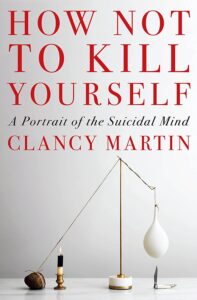
Clancy Martin, How Not to Kill Yourself: A Portrait of the Suicidal Mind
Pantheon, March 28
Based on his viral HuffPo essay, “I’m Still Here,” Martin’s new book takes a frank look at his multiple suicide attempts, providing an “intimate depiction of the mindset of someone obsessed with self-destruction.” Touching on the thinking and writing of other writers who have committed or considered suicide, as well as what the history of philosophy has to say for and against it, Martin’s book is a critical memoir diving headfirst into our darkest and most taboo desire. –EF
APRIL
Jamie Stewart, Anything That Moves
And Other Stories, April 4
Yes, that would be Jamie Stewart of Xiu Xiu, the moody experimental rock band that may or may not have soundtracked some of my most tragic college midnights. Appropriately, it is “a memoir told in 33 outrageous hook-ups” that its publisher describes as “an extraordinary, cringy, unputdownable miniature epic, burning always with radical and often shocking self-criticism.” As I would have put it at the peak of my Xiu Xiu fandom: yesssssssssssssssssssssss. –ET
Curtis Sittenfeld, Romantic Comedy
Random House, April 4
I am here to read anything Curtis Sittenfeld writes, including this sweet little rom-com about an SNL–esque comedy writer who pokes fun at the phenomenon of average-looking male comedians dating out of their league (AKA, the Pete Davidson effect), only to feel sparks with the show’s latest host and musical guest, a hottie who (surprise, surprise) exclusively dates models. More average-looking funny ladies with himbos, please! –ES
Nana Kwame Adjei-Brenyah, Chain-Gang All-Stars
Pantheon, April 4
I stayed up far too late reading just one more chapter of this blazing debut novel from Friday Black author Adjei-Brenyah. Set in a near-future United States where the extreme inhumanity of the private prison system has produced Criminal Action Penal Entertainment (CAPE)—a gladiatorial sports league/reality television juggernaut wherein incarcerated men and women fight to the death for the chance to eventually, maybe, win freedom.
Lovers Loretta Thurwar and Hamara “Hurricane Staxxx” Stacker are the worshiped stars of the circuit, Mari is the abolitionist daughter of one of CAPE’s recently murdered veteran fighters, and “Jungle” Craft and “Singer” Hendrix are two ultra-violent felons, broken and remade monstrous by the brutality of their prison conditions. A damning indictment of mass incarceration, systemic racism, and the grotesqueries of unfettered American capitalism, Chain-Gang All-Stars is also a breathless dystopian thriller. It will make one hell of a prestige miniseries. –DS
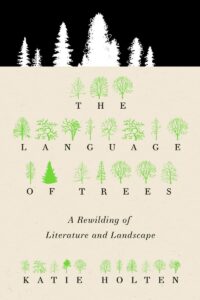
Katie Holten, The Language of Trees: A Rewilding of Literature and Landscape
Tin House, April 4
Irish artist Katie Holten is an environmental activist whose ecological art centers the anthropocene. “At the root of her practice is a commitment to study the inextricable relationship between Humans and Nature, between organic systems and human-made systems.” I love her Tree Alphabet, which showcases “trees,” her bespoke font that she’s also made available to download. Her new book, The Language of Trees, uses “trees” to translate a compendium of well-known, loved, lost and new writing—it will be an unmissable art object that I’m really looking forward to. –EF
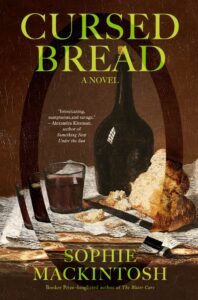
Sophie Mackintosh, Cursed Bread
Doubleday, April 4
I loved Mackintosh’s The Water Cure and Blue Ticket, so I was absolutely going to read her next novel even if it didn’t have one of the best titles of the season, and even if it wasn’t based on a real-life mass poisoning of a French village in the 1950s, and even if it hadn’t been described as “an erotic fable of transformation.” But it does, and it is, and it has been, and I am, forgive me, finding myself very hungry for bread. –ET
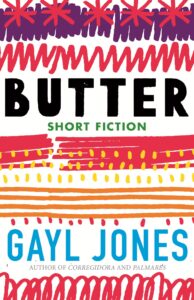
Gayl Jones, Butter: Novellas, Stories, and Fragments
Beacon, April 4
The return of Gayl Jones (once memorably described by Calvin Baker as “The Best American Novelist Whose Name You May Not Know.”) has been one of the most heartening publishing stories of recent years. Like busses, you wait forever for a new Gayl Jones book to arrive and then two (or in this case, three) come at once. 2021’s Palmares, the author’s first published work in over two decades, was met with critical acclaim and a nomination for the 2022 Pulitzer Prize. Last year’s The Birdcatcher also garnered strong reviews and was a finalist for the National Book Award. Hot on the heels of those two novels comes Butter, a wide-ranging collection of novellas and stories, “in a range of settings and styles, from the hyperrealist to the mystical, in intricate multipart stories, in more traditional forms, and even in short fragments.” April can’t come soon enough. –DS
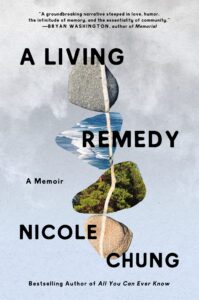
Nicole Chung, A Living Remedy
Ecco, April 4
The HarperCollins Union has been on strike since November 10, 2022. Literary Hub stands in solidarity with the union. Please consider donating to the strike fund.
Nicole Chung’s debut memoir, All You Can Ever Know, was a national bestseller, and this one also stands to spark a major and essential conversation. Here, she writes about the guilt of ascending social class (and realizing that your childhood version of “middle class” was not, in fact, middle class), the life-or-death consequences of financial insecurity and our broken medical system, and the grief of being separated from a dying parent during the pandemic. Chung excels at excavating both the personal and the systemic; I can’t wait to read her latest. –ES
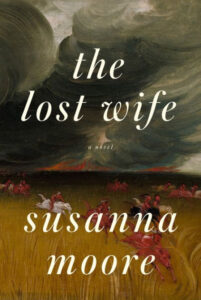
Susanna Moore, The Lost Wife
Knopf, April 4
After ten years, we’re finally getting a new novel by my personal tormentor Susanna Moore—and it’s a Western. That is, it’s a “brilliantly subversive tale of the conquest of the American West”: the story of a white woman who gets caught in the middle of the Sioux Uprising of 1862. I can only expect that it will be absolutely devastating in more ways than one. –ET
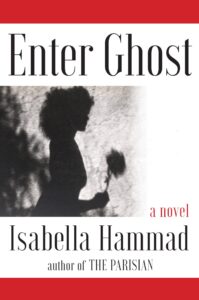
Isabella Hammad, Enter Ghost
Grove, April 4
If you liked The Parisian, you’ll love Enter Ghost. From Plimpton Prize winner and 5 Under 35 honoree Isabella Hammad, this is the story of a woman on the brink. Sonia is an actor. She’s been off chasing her dreams, but when her relationship with a director ends, she returns home to process her grief and make sense of her life. While staying with her sister, Haneen, Sonia grapples with the idea of home and how to find your proper place in it after a long period away. She also falls in with a new crowd: a theater troupe putting together a production of Hamlet in the West Bank. In Enter Ghost, Isabella Hammad’s characters contend with displacement, ancestral home, authenticity, and the shimmering possibility of finding yourself in unlikely places. Sisterhood, soul-searching, and Shakespeare—what more could you ask for? –KY
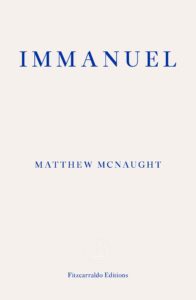
Matthew McNaught, Immanuel
Fitzcarraldo Editions, April 4
Immanuel, which back in 2016 was the winner of the inaugural Fitzcarraldo Editions Essay Prize, is now a book-length work of nonfiction “about faith, doubt and radical religion,” inspired by McNaught’s experiences growing up in an evangelical Christian community, and watching his friends become radicalized, moving to Nigeria to become disciples of charismatic millionaire pastor TB Joshua. Sounds absolutely fascinating. –ET
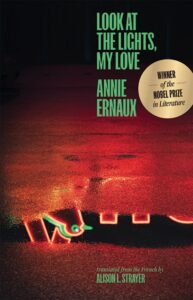
Annie Ernaux, tr. Alison L. Strayer, Look at the Lights, My Love
Yale University Press, April 4
Listen, there’s something poetic about big chain grocery stores. (If you’ve seen the Joe Pera Talks with You episode “Joe Pera Takes You to the Grocery Store,” you know what I’m talking about.) A setting that’s been largely ignored in literature, leave it to newly minted Nobel Laureate Annie Ernaux to find much to meditate upon inside those hideously florescent-lit aisles. –ES
Alejandro Varela, The People Who Report More Stress
Astra House, April 4
Varela’s debut novel, The Town of Babylon, came out just last year and was a finalist for the National Book Award—so you know he’s got chops. His second book is “a collection of interconnected stories brimming with the anxieties of people who retreat into themselves while living in the margins, acutely aware of the stresses that modern life takes upon the body and the body politic.” I already love Varela’s sense of humor and way of approaching the world, and I’m sure I will love these too. –ET
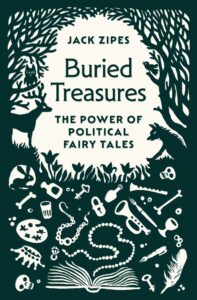
Jack Zipes, Buried Treasures: The Power of Political Fairy Tales
Princeton University Press, April 4
Zipes is one of our most venerable and important fairy tale scholars; a new book from him is always something to anticipate for those interested in the form. In this volume, he highlights political fairy tale authors and illustrators from the 19th and 20th centuries, artists who “used their remarkable talents to confront political oppression and economic exploitation by creating alternative, imaginative worlds that test the ethics and morals of the real world and expose hidden truths.” –ET
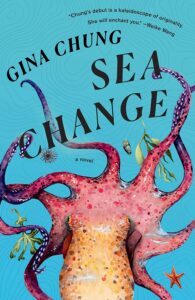
Gina Chung, Sea Change
Vintage, March 24
This stellar debut novel opens on a horny octopus. I feel like this blurb could end there, because you’re probably sold, but I’ll keep going. Sea Change is the story of Ro, a thirty-something year-old woman, adrift in life. She works at a mall aquarium, tending to the aforementioned sea creature, a giant Pacific octopus named Dolores. Dolores proves to be excellent company, especially since Ro’s boyfriend has abandoned her for a volunteer expedition to Mars and her best friend seems to be growing up without her. But one day, Dolores is sold to a private aquarium, and Ro has to come to terms with her life in the face of yet another loss. This one is particularly devastating because Dolores also serves as a reminder of Ro’s father, a marine biologist who disappeared in the Bering Vortex (where Dolores is from).
Gina Chung writes about the marvels of marine life with such intense care and beauty. For instance, I have learned that the Bering Vortex is an especially terrifying part of the ocean that has fascinated scientists because it produces creatures that can thrive in unwelcoming conditions, which is to say that much like Dolores, Ro is a character that has fought for her own survival, and it is an absolute pleasure to cheer her on. This is Gina Chung’s first book, but there is a wealth of her fiction online. I recommend starting with “Mantis,” a perfect showcase of her ability to distill the facts of the natural world into something hilariously human. Sea Change is sure to make a splash! (Sorry.) Get ready to dive in! –KY
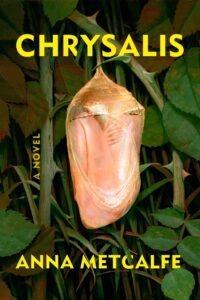
Anna Metcalfe, Chrysalis
Random House, April 11
Chrysalis poses the important and metaphorical question, “what happens when a woman dares to take up space?” The woman in question has decided to physically alter her body, growing bigger and stronger through workouts and diet and supplements—her friends and family watch, and wonder, and worry, as the transformation unceasingly takes place. Unquestionably due to trauma, her urge to grow strong is at first understandable, but leads to something more mysterious and shape-shifting as she becomes a guru figure on social media to thousands of acolytes. Taking on questions of femininity and expectation, as well as social media and its ability to make a cult leader of anyone, Chrysalis raises as many questions as it answers about our society and our place within it. –JH
Izumi Suzuki, tr. Daniel Joseph, Sam Bett, Helen O’Horan, and David Boyd, Hit Parade of Tears
Verso, April 11
Last year, Verso introduced the English-speaking world to the genius of Izumi Suzuki with the publication of Terminal Boredom, a collection of stories that are hard to pin down. A little speculative, a little punk, a little chaotic—all singular in their voice and vision. In this new collection, there will be cheating husbands, score settling, alternate timelines, bored teens, and space pirates. One way to describe her writing might be unhinged, but I think another applicable word is freeing. What a thrill it is to see that more of her stories are coming down the pipes. –KY
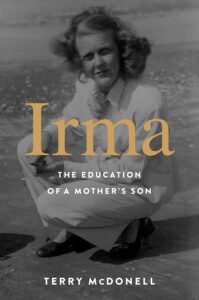
Terry McDonell, Irma: The Education of a Mother’s Son
Harper, April 11
The HarperCollins Union has been on strike since November 10, 2022. Literary Hub stands in solidarity with the union. Please consider donating to the strike fund.
McDonell’s The Accidental Life was an insider’s look at what it took to be an editor at Rolling Stone, Esquire, and Sports Illustrated and to work with writers like Hunter S. Thompson and David Carr. Full of wisdom for editors and writers alike (such as how to deal with rejection), it was a wonderful, gossipy, fun read. In his new memoir, Irma, McDonell looks back at his mother—a twenty-five year old widow who picked up their lives and moved to California for a new life. This promises to be a stunning portrait of a woman “who built the life she wanted as she raised her son to be the kind of man and father he had longed for but never knew.” –EF
Jeff VanderMeer, Veniss Underground
MCD, April 11
Jeff VanderMeer hive, rise up! If you loved Annihilation, Borne, Dead Astronauts, and Hummingbird Salamander, you’re going to want to read Veniss Underground. Prepare to be transported. Veniss is a surreal city, but what’s underneath is even more fantastical: a mysterious maze of tunnels. This is a world where Living Artists create with biological material. It’s also a world where humans are recycled. Our guides are Nicholas, a just-okay Artist; his twin sister, Nicola; and Nicola’s former lover. Veniss Underground is actually the very first novel by this beloved writer, being reissued with a foreword by National Book Award winner Charles Yu. With a writer as prolific as Jeff VanderMeer, I always find it fun to go back and read the early work, to see the questions they were always trying to answer, the first seeds. –KY
Charles Frazier, The Trackers
Ecco, April 11
The HarperCollins Union has been on strike since November 10, 2022. Literary Hub stands in solidarity with the union. Please consider donating to the strike fund.
The latest novel from the bestselling author of Cold Mountain follows Val Welch, a painter in Depression-era America, who landed a job creating a mural for the new post office in Dawes, Wyoming. There, he meets John and Eve Long, a mysterious couple with whom Val quickly becomes enchanted, and—when Eve disappears—hopelessly entangled. –ET
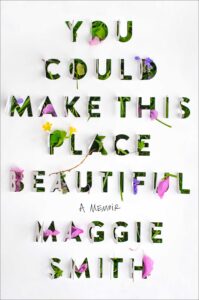
Maggie Smith, You Could Make This Place Beautiful
Atria, April 11
I’ve had Maggie Smith’s poem “Good Bones” running through my head on a loop since I read it years ago, its ending such a promise, a desperate wish: “This place could be beautiful / right? You could make this place beautiful.” I have no doubt I will be just as struck by her prose as her poetry, and can’t wait to get my hands on her new memoir. Tackling the dissolution of her marriage, the hard, lonely grief of that heartbreak, and the tremendous task of rebuilding a life, You Could Make This Place Beautiful promises to both devastate and heal, whether you’re going through a breakup or life-change, or whether you are simply attuned to the fact that at any moment, life as we know it can turn on a dime. Of all people, I trust Smith to lead us through the wreckage, through the fixer-upper, acknowledge the suffering, and lead us to new beginnings and new life. –JH
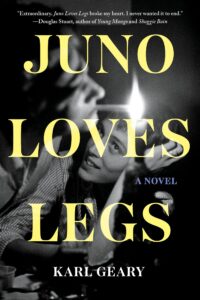
Karl Geary, Juno Loves Legs
Catapult, April 18
I was fortunate enough to recently get my hands on an early copy of this beautiful, aching sophomore novel by Karl Geary, which follows two young, working-class misfits in 1980s Dublin as they try to survive, and find joy, in a world that rejects and abuses them at every turn. Juno Loves Legs is a gorgeous, devastating ode to the sustaining power of friendship, as well as exquisitely atmospheric portrait of a city. A great Dublin novel. A great novel, period. –DS
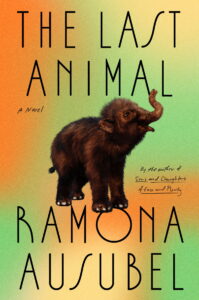
Ramona Ausubel, The Last Animal
Riverhead, April 18
I’ve been a fan of Ausubel’s big-hearted, finely crafted, magic-tinged books since 2012’s No One is Here Except All of Us; a new novel from her is always a reason for celebration. And The Last Animal sounds exactly right: a woman takes her teenage daughters with her on a scientific expedition to Siberia, where they discover a preserved baby mammoth in the ice. Thus kicks off a novel that, as the publisher tells me, “explores the possibility and peril of the human imagination on a changing planet, what it’s like to be a woman and a mother in a field dominated by men, and how a wondrous discovery can best be enjoyed with family. Even teenagers.” Ha. Can’t wait. –ET
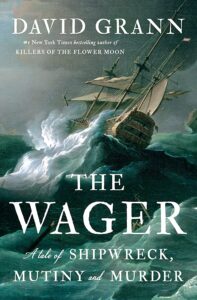
David Grann, The Wager: A Tale of Shipwreck, Mutiny and Murder
Doubleday, April 18
Grann is not only a meticulous researcher, but a brilliant storyteller too. In The Wager, we get a wild tale of shipwrecks, mutiny, and court marital; its lessons—about how people tell stories, and who to believe—are eerily prescient today. In 1742, thirty emaciated sailors—survivors of a ship that left England two years before and had wrecked on a desolate island off the coast of Patagonia—wash up on the coast of Brazil. Then, six months later, another boat lands off the coast of Chile with three castaways—and their story is very different. They claim the thirty sailors are actually mutineers. The first group accuses the new arrivals as murderous senior officers. A court martial is called to determine the truth. Grann pulls the story together from archival materials, diaries, and court documents (he even traveled to the island where the sailors were marooned), all to get to the truth. But whose truth matters most depends on who has the best story to tell. –EF
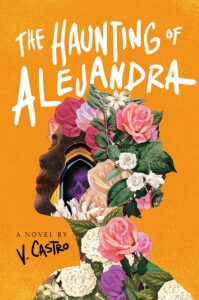
V. Castro, The Haunting of Alejandra
Del Rey, April 18
V. Castro’s heroine is haunted by the spirit of La Llorena—or, at least, an ancient evil that has found a way to embody a folk legend. She must go to a curandera and process her personal and generational trauma before she can even hope to be free of the demon possessing her, in what also functions as a perfect metaphor for clearing the fog of depression and seeing the societal structures and history that contribute to our present-day malaise. –MO
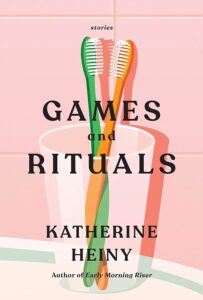
Katherine Heiny, Games and Rituals
Knopf, April 18
Katherine Heiny’s Early Morning Riser was a delight and a balm, so I have high hopes for her latest story collection, which includes eleven stories of love in its myriad forms. I have a feeling I’ll be parceling them out to savor when I’m in need of literary pick-me-ups. –JG
Katy Simpson Smith, The Weeds
FSG, April 18
From the author of The Everlasting comes another centuries-spanning story, this time set in the (ruins/jungle of the) Roman Colosseum. In present day, a woman from Mississippi is remaking her life. In 1854, another woman is serving time (and longing for a lost love). Both women catalog the plant life of their surroundings, as Katy Simpson Smith muses on the constraints and choices of women trying simply to survive. –ES
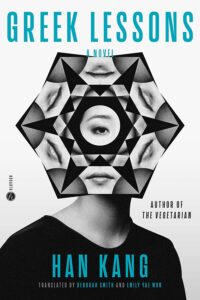
Han Kang, tr. Deborah Smith and Emily Yae Won, Greek Lessons
Hogarth, April 18
I still think about Han Kang’s beautiful and terrifying The Vegetarian, which won the International Booker Prize in 2016, all the time; if her latest novel—in which a woman who has lost her language and a man who is losing his sight find themselves drawn together—is half as good, it’ll be one of the best books of the year. –ET
Jonathan Kennedy, Pathogenesis: A History of the World in Eight Plagues
Crown, April 18
Plagues! As we close out Year III of our Covid-reshaped world, here comes a book about how the major transformations of the last sixty-thousand years have all been caused by similarly pesky germs. Professor Kennedy—drawing on the latest research in fields ranging from genetics and anthropology to archaeology and economics—explores eight major outbreaks of infectious disease across the entire history of civilization, from the Neanderthal era to the rise of the US as a global superpower, to challenge “some of the most fundamental assumptions about our collective past.” It’s not often you pick up a book that promises to alter your entire understanding of the story of humanity. –DS
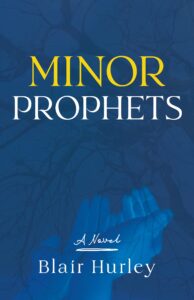
Blair Hurley, Minor Prophets
Ig Publishing, April 18
In Hurley’s captivating second novel, after 2018’s The Devoted, Nora is working in hospice care in Chicago when she receives a mysterious message that makes her peer back into her past, only to discover that her father, who—with her help—led an apocalyptic religious cult in Michigan’s Upper Peninsula, has died mysteriously by gunshot. What follows is the story of her childhood, speaking in tongues and prophecies for her father’s growing congregation, and the spiral into madness, and in the book’s harrowing conclusion, at last, the true story of what happened the night she escaped, and the night her father died. –ET

Lucinda Williams, Don’t Tell Anybody the Secrets I Told You
Crown, April 25
What more needs to be said? It’s Lucinda Williams’ autobiography, people! This is the kind of memoir I didn’t even know I was waiting for, but as one of the many millions of fans awestruck and captivated by Williams’ music, lyrics, and general badass vibe, I am now counting down the days till the book is in my hands. I’ve inhaled every interview with Williams I’ve come across: she is that rare entity of a true, honest-to-god, outlaw country star. She came from almost nothing, built her way up playing in dive bars, brushed shoulders with other country greats like Townes Van Zandt, Blaze Foley, and is still around to not only tell the tale, but continues to perform and release new music. I for one cannot wait to hear the tale, and any secrets she’s kept for this long; what a gift to get a peek behind the scenes on a life and legacy such as hers. –JH
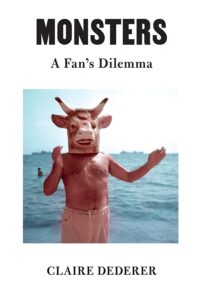
Claire Dederer, Monsters: A Fan’s Dilemma
Knopf, April 25
In this very personal work of cultural criticism, Dederer expands on her excellent 2017 Paris Review essay about how to think about the work of monstrous men, which opens with uncertainty. “They did or said something awful, and made something great. The awful thing disrupts the great work; we can’t watch or listen to or read the great work without remembering the awful thing. Flooded with knowledge of the maker’s monstrousness, we turn away, overcome by disgust. Or … we don’t. We continue watching, separating or trying to separate the artist from the art. Either way: disruption. They are monster geniuses, and I don’t know what to do about them.” Me either, but I would like to find out. –ET
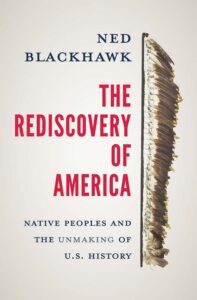
Ned Blackhawk, The Rediscovery of America: Native Peoples and the Unmaking of U.S. History
Yale University Press, April 25
It is not at all controversial (unless you sit on a Florida school board) to state that the overarching narrative of American history is anchored in white supremacist settler-colonial mythologies created in the service of empire. I’m sorry but it’s not! In the important tradition of corrective histories like Bury My Heart at Wounded Knee, Blackhawk (Western Shoshone) addresses five centuries of historical blank space, retelling the story of America’s birth from the perspective of those embattled Indigenous nations who fought—and keep fighting—to maintain some semblance of their ancestral ways of life. –JD
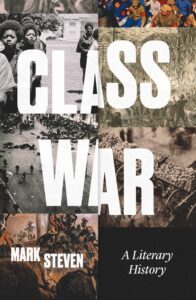
Mark Steven, Class War: A Literary History
Verso, April 25
A survey of the literature of revolution, Mark Steven’s history of global class war considers work by writers from Byron to Assata Shakur. It feels more crucial than ever to study the work of writers who practiced solidarity, and this book promised to be a vital contribution to the revolutionary canon. –JG
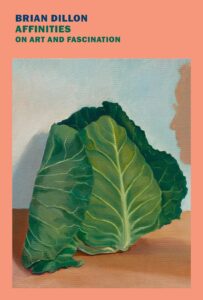
Brian Dillon, Affinities: On Art and Fascination
NYRB, April 25
The third book in Dillon’s trilogy of close reading, after Essayism and Suppose a Sentence, shifts from text to image, analyzing the pleasures of art and looking, and also the pleasure of that particular feeling of connection we call affinity. Sure to be another satisfying installment of Dillon’s blend of personal reflection and highly specific arts criticism. –ET

Adam Sternbergh, The Eden Test
Flatiron, April 25
Daisy and Craig’s marriage is in trouble: they both have been harboring secrets, and it seems clear that Craig is planning to leave Daisy for another woman. Daisy finds out about “The Eden Test”, a week-long cabin retreat that promises to deliver struggling married couples a fresh start, and decides it’s now or never for her and Craig. The couple gets more than they bargained for at the retreat however: each day a new question is posed of them that scrapes up more lies and confessions than they thought possible. Will Craig and Daisy make it out of this week with their relationship intact—or will they make it out at all? –JH
MAY
John Wray, Gone to the Wolves
FSG, May 2
If you’ve ever read up on the early 90s Norwegian black metal scene, you’ll know that shit got extremely real extremely quickly up there. What began as a bit of casual Satanism on the weekends soon became something far darker and more violent than most of the movement’s young participants could ever have imagined. Godsend and The Lost Time Accidents author John Wray’s epic new novel, which explores the heavy metal scenes in LA and Northern Europe in the 80s and 90s from the perspective of three Florida runaways, sounds like the first major literary exploration of this anarchic underground community. I’m excited to take the plunge. –DS
Hannah Pittard, We Are Too Many: A Memoir [Kind of]
Henry Holt, May 2
The inciting incident of Hannah Pittard’s genre-bending memoir is a doozy: she discovers her husband has been having an affair with her best friend. In We Are Too Many, Pittard blends fact and fiction to approach this betrayal, in a book that’s described as “radically honest to an unthinkable degree.” Here for it! –ES
Mary Beth Keane, The Half Moon
Scribner, May 2
Malcolm and Jess are married, in love, but are facing a moment of transition: Jess is realizing she can’t have a baby, and wondering how to reconceive her vision of her life, and Malcolm is finally ready to buy the bar he’s worked at for years and begin a new chapter. Both feel suddenly aware of time passing, youth being foregone, and change being inevitable and complicated, but whether they know how to do it together, or need to go it alone, is the point on which The Half Moon turns. –JH
Abraham Verghese, The Covenant of Water
Grove Press, May 2
Fourteen years after his hugely popular Cutting for Stone, Verghese’s new novel is an epic story beginning in 1900 and spanning through to the 1970s—it follows three generations of a family that suffers from a peculiar affliction: in every generation, at least one person dies by drowning, and in Kerala, water is everywhere. A story of love, faith, and medicine, set against the historical progress of India. –EF
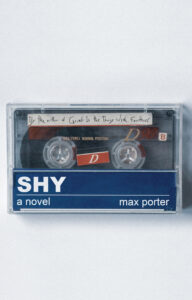
Max Porter, Shy
Graywolf Press, May 2
Max Porter’s books are always as much poetry as they are prose; they are tiny works of art that never fail to move and engage. Shy drops us into the mind of a teenage boy who is walking into the night, away from Last Chance, a home for “very disturbed young men,” and toward—what? (Isn’t that always the question.) –ET
Hopeton Hay, Scott Montgomery, Molly Odintz (eds.), Austin Noir
Akashic Books, May 2
The long-running Akashic noir series gets a standout installment this year, with a new collection focused on stories from one of America’s most fascinating cities, still clinging to its traditional “weirdness” but also reckoning with a massive influx of money and an extreme clash of cultures that in many ways stands in for the broader forces at play in America today. The new collection has stories from Gabino Iglesias, Ace Atkins, and more, and with Molly Odintz [who happens to be an editor at CrimeReads and a contributor to this list], Scott Montgomery, and Hopeton Hays handling editorial duties, the volume takes on a rare sophistication worthy of its subject. This is the collection the city—and noir readers everywhere—deserve. –DM
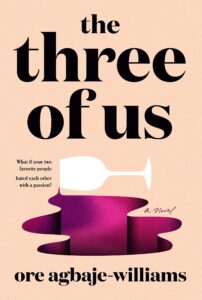
Ore Agbaje-Williams, The Three of Us
Putnam, May 16
I love novels that take place in a single day, in a single location; they make me feel like I’m at the theater—an experience I miss deeply. Ore Agbaje-Williams’ debut novel is a biting comedy of manners with a delightfully simple, but incredibly fertile, premise: What if the two most important people in your life hated each other with a passion? The long-simmering tensions between a husband, his wife, and her best friend finally come to a head when the husband returns home early from work and interrupts what was supposed to be a lazy afternoon between BFFs. Over three acts, as the thin walls of tact and civility begin to erode, all manner of scabrously hilarious confessions and accusations burst through. Hook it to my veins. –DS
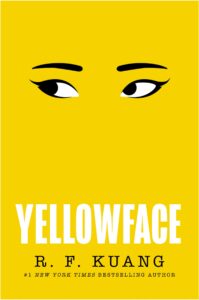
R.F. Kuang, Yellowface
William Morrow, May 16
The HarperCollins Union has been on strike since November 10, 2022. Literary Hub stands in solidarity with the union. Please consider donating to the strike fund.
I’ve been enjoying the recent crop of novels exploring the anxieties of authorship—Jean Hanff Korelitz’s The Plot, Andrew Lipstein’s Last Resort, and Yiyun Li’s The Book of Goose being a few examples—so I’m excited to check out R.F. Kuang’s debut, which goes a step further to explore cultural appropriation. Here’s the gist: June Hayward and Athena Liu are both on the author track, but only Liu is seeing success. When she dies in a freak accident, June steals her just-finished manuscript, about the efforts of Chinese laborers during WWI, and passes it off as her own—under the guise of “Juniper Song” and an ethnically ambiguous author photo. Yikes! (I wonder if these white guys will take notice?) –ES
Jonathan Eig, King: A Life
FSG, May 16
Bestselling author and former Wall Street Journal senior writer Jonathan Eig’s new biography of Martin Luther King Jr. is the first to appear in decades, and also the first to incorporate recently declassified FBI files on the civil rights icon. The publisher describes it as a “landmark biography” that “gives us an MLK for our times: a deep thinker, a brilliant strategist, a perplexing husband and father, and a committed radical who led one of history’s greatest movements, and whose demands for racial and economic justice remain as urgent today as they were in his lifetime.” –ET
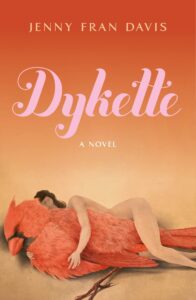
Jenny Fran Davis, Dykette
Henry Holt, May 16
Honestly . . . this cover alone. But as a bonus, this is a book about three queer couples who spend ten days together in an upstate country house, where things get messy, embarrassing, hilarious, and yes, sexy. Melissa Febos called it “a portrait of a certain corner of queer culture that is part satire, part ode, and full of delightful cringe,” which seems like something we could all use in 2023. –ET
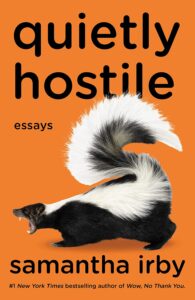
Samantha Irby, Quietly Hostile
Vintage Anchor, May 16
Samantha Irby is the most reliably hilarious essayists working now, so any time she publishes a new collection, it’s cause for celebration. Quietly Hostile details her new “bourgeois life of a Hallmark Channel dream” living in a Blue town in the middle of a Red state with her wife, complete with bad friend dates, nightmarishly slapstick Hollywood meetings, and the inevitable bodily breakdowns that accompany middle age. I look forward to laughing—helplessly, breathlessly—at all of it. –JG
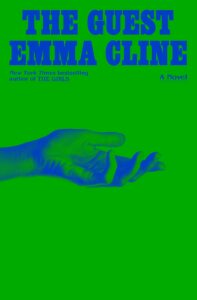
Emma Cline, The Guest
Random House, May 16
Emma Cline’s second novel is tense and restrained, as careful and controlled as the woman at its center—before she begins to unravel at the seams. This is a slow-motion car crash of a book, just one person trying as hard as they can to avert an almost inevitable disaster, and no matter how bad things get, it’s extremely hard to look away. –ET
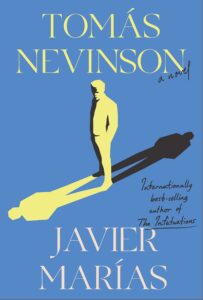
Javier Marías, tr. Margaret Jull Costa, Tomás Nevinson
Knopf, May 23
The last novel from Spain’s most thrillingly poetic mystery writer, who died this year, follows a man recruited into the British Secret Service, tasked with identifying and neutralizing the woman responsible for a series of terrorist attacks. But as always with Marías, the plot is really beside the point—it’s the way things are told, and the way the author’s brain works, that will keep your nose in the pages. –ET
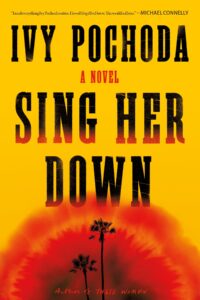
Ivy Pochoda, Sing Her Down
MCD, May 23
Ivy Pochoda is one of the great writers of today, crime or otherwise, although luckily for me, she writes pure noir. Her latest plays with tropes of the western as two former cellmates from an Arizona prison engage in a cat-and-mouse game after both achieve release. I will be spending my holidays reading this amazing new novel so that I can recommend it to you all in far more detail come the new year. You’re welcome, my darlings (although reading this book is truly the opposite of sacrifice). –MO
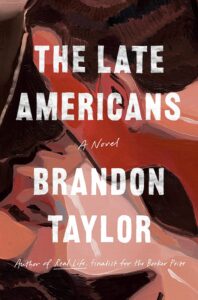
Brandon Taylor, The Late Americans
Riverhead, May 23
The latest novel by the author of Real Life and Filthy Animals will hit a lot of writers where they live: finishing out the MFA in Iowa City. It is populated by characters whom Taylor has described as “all on the brink in some crucial way, whether spiritually, psychically, career-wise, or economically,” which . . . will also hit a lot of writers (and readers) where they live. –ET
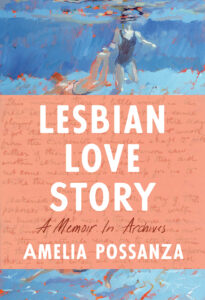
Amelia Possanza, Lesbian Love Story
Catapult, May 30
When Possanza moved to Brooklyn and joined the world’s largest LGBTQ swim team, she found herself surrounded by queer stories. Her debut memoir centers around seven lesbian love stories of the twentieth century in an effort to find women who would inspire her both in love and life. A compelling history in praise of the research archive, Possanza asks and attempts to answer, what is lesbian love? –EF
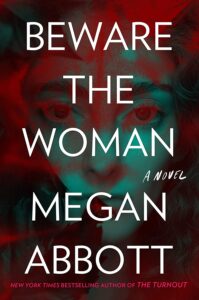
Megan Abbott, Beware the Woman
Putnam, May 30
Megan Abbott goes Rosemary’s Baby! A pregnant woman and her doting husband head to a family retreat in the woods, ready to relax with the knowledge that her father-in-law is a doctor. But a sudden health scare, and the family’s strict supervision of her activities, make the cottage start to feel more like a prison, and Abbott’s narrator starts to get a bad feeling about her mother-in-law’s early demise. Abbott has already proven that teenage girlhood is Noir AF, so I’m psyched to read her do the same thing for pregnancy. –MO
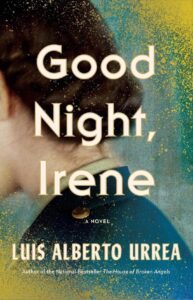
Luis Alberto Urrea, Good Night, Irene
Little, Brown, May 30
The main character in Urrea’s latest novel is based on his own mother, who was one of the “Donut Dollies”—American women sent to Europe during WWII by the American Red Cross to serve coffee and donuts to the homesick troops. A different kind of war story from a celebrated author of both fiction and nonfiction. –ET
JUNE
S. A. Cosby, All The Sinners Bleed
Flatiron, June 6
Why isn’t this one on Netgalley yet, she cries into the abyss? Anyway, despite my lack of access to this book at the moment, I can assure you that S. A. Cosby is awesome and his new book is bound to be awesome too. In Cosby’s latest, the first Black sheriff of a small Southern town investigates the murder of an unarmed black man and finds himself uncovering dangerous secrets about the very foundations of his community. –MO
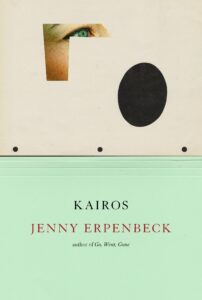
Jenny Erpenbeck, tr. Michael Hofmann, Kairos
New Directions, June 6
In June New Directions will publish Kairos by the brilliant Jenny Erpenbeck. The story follows 19-year-old East-Berliner Katharina and her affair with an older, married writer, Hans, against the background of the declining GDR. Erpenbeck’s novels use finely observed (cool, unsentimental) personal relationships as lenses that provide panoramic views of broader society—her novels are as much about history, time, and place as they are about the characters that inhabit them. In doing so, she reveals more about humanity than most writers could in a lifetime. This one is not to be missed! –EF
Katie Williams, My Murder
Riverhead, June 6
Who in the world doesn’t like a murder mystery, especially one that goes beyond the rote formula of: murder occurring, detective arriving, clues discovered, murderer revealed? My Murder indisputably upends the traditional format while delivering the excitement and mystery we’ve come to expect from the genre. In this novel, the murder victim, Lou, is brought back to life (bear with) under a government experiment, returned to her happy life and adorable child, given a second chance to live the life that shouldn’t have been cut short. But while Lou knows she should be grateful, she’s paralyzed with fear and questions surrounding her murder that are left up to her to understand and uncover—everybody is a suspect, nobody is to be trusted.This genre-bending, magical realist, darkly clever novel isn’t to be missed. –JH
Rita Chang-Eppig, Deep as the Sky, Red as the Sea
Bloomsbury, June 6
Hello, yes, please sign me right up for this adventure novel about Shek Yeung, Chinese pirate queen of life and legend, who commands a fleet, has a child on the high seas, and fights for both with all the ferocity you would expect. –ET
Amy Brady, Ice: From Mixed Drinks to Skating Rinks—a Cool History of a Hot Commodity
Putnam, June 6
Much like Colonel Aureliano Buendía and his father, I’ve always been fascinated by ice, and eager for somebody to write a decent narrative history of the stuff. Thankfully, someone now has. Ice is a history of ice written by Orion Magazine executive director and brilliant writer/climate journalist Amy Brady (The World as We Knew It: Dispatches from a Changing Climate), who details “the strange and storied two-hundred-year-old history of ice in America,” from mixed drinks to motel hallways, skating rinks to cryotherapy treatments. She also considers what the future of this civilization-altering substance might look like on a rapidly warming planet. –DS
Deborah Levy, August Blue
FSG, June 6
A new Deborah Levy novel is always cause for celebration. In The Cost of Living, Real Estate, and Hot Milk (a fan favorite amongst my friends), this Booker Prize finalist has time and time again proven herself to be a master of the written word. I’m particularly excited to read her new novel, August Blue, which is about a woman who comes face-to-face with her doppelganger. This doppelganger, at the time of their encounter, was purchasing mechanical dancing horses—a detail in the book’s description that only leaves me more intrigued. It promises to be a story of fractured selves, alter egos, and an adventure into the wild uncanny. –KY
Claire Fuller, The Memory of Animals
Tin House, June 6
There’s a deadly pandemic going on, and Neffy, a 27-year-old marine biologist, volunteers for an experimental vaccine trial in London. As the pandemic causes chaos around the world, Neffy uses a controversial device that allows her to revisit her past (with several appearances from her beloved octopi). Winner of the 2021 Costa Novel Award, The Memory of Animals promises to be thought-provoking and close to home. –ES
Henry Hoke, Open Throat
MCD, June 6
I defy you to hear the premise of this sophomore novel from the always-interesting Henry Hoke (The Groundhog Forever) and not immediately smash that preorder button. Ready? Here it is: A queer and dangerously hungry mountain lion lives in the drought-devastated land under the Hollywood sign. Lonely and fascinated by humanity’s foibles, the lion spends their days protecting the welfare of a nearby homeless encampment … When a man-made fire engulfs the encampment, the lion is forced from the hills down into the city the hikers call “ellay” … to face down the ultimate question: Do they want to eat a person, or become one? Tragically relevant now, in the wake of beloved Los Angeles mountain lion P-22’s death last month, Open Throat sounds like a playful, poignant, tragicomic delight, reminiscent of William Kotzwinkle’s 1996 novel, The Bear Went Over the Mountain. –DS
Keziah Weir, The Mythmakers
Scribner, June 13
When Sal Cannon, a young journalist who’s struggling in both love and career, reads a novel excerpt by an older, established writer that’s about the moment, years ago, when he and Sal met, she becomes obsessed with reading the novel and learning about the (now late) author’s life. Keziah Weir’s debut novel grapples with questions of creativity, ambition, and the perpetually relevant matter of who owns a story. I look forward to getting tangled up in all of them. –JG
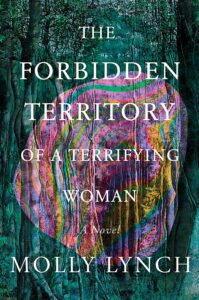
Molly Lynch, The Forbidden Territory of a Terrifying Woman
Catapult, June 13
This debut novel hits all the right themes: marriage, motherhood, ecological collapse, and the insidious ramifications of capitalism. In The Forbidden Territory of a Terrifying Woman, mothers are disappearing across the globe, quietly vanishing without a trace; families and police alike are dumbfounded and desperate to understand the sudden epidemic of missing women. Focusing on the story of Ada and Danny, a married couple in Michigan, The Forbidden Territory of a Terrifying Woman recounts how Ada disappears from their bed one night, leaving Danny and their child bereft and bewildered at how to go on. Written Fates and Furies style, alternating between Danny and Ada’s perspectives, the novel navigates with metaphor and meaning the mystery of the mothers’ disappearances, and the breakdown of the world they left behind. –JH
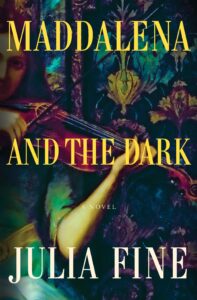
Julia Fine, Maddalena and the Dark
Flatiron, June 13
The latest novel from the author of What Should be Wild and The Upstairs House has everything I like: a dangerous friendship between two teenage girls, a compelling setting (an 18th century Venetian music school!), an undercurrent from magic, and a blurb from Kelly Link, who calls this “a sumptuous feast of a novel, rich and strange and heady.” I think I will just indulge. –ET
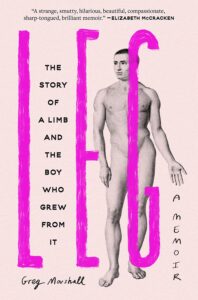
Greg Marshall, Leg: The Story of a Limb and the Boy Who Grew from It
Abrams, June 13
Greg Marshall’s memoir about “coming of age in two closets—as a gay man and as a man living with cerebral palsy” promises to be both smart and heartfelt (you can get a taste for his style with this great conversation with Chloé Cooper Jones we ran earlier this year). His honesty and clarity in writing about disability makes this debut one to watch. –EF
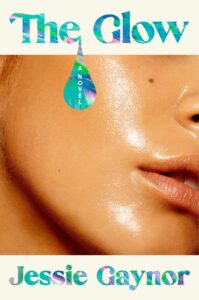
Jessie Gaynor, The Glow
Random House, June 20
In addition to being an amazing editor at this very website, Gaynor is a great writer (you’ve certainly chuckled to her posts on our blog) who’s turned her critical eye to the self-care industry in her debut novel, The Glow. PR manager Jane Dorner tries to save her career by turning Cass and her husband’s ramshackle “wellness retreat” FortPath into an influencer and high-end wellness brand. Trades have been calling it “whip-smart” and “bitingly funny,” and Michael Cunningham calls it “Jane Austen on steroids”: get ready to laugh (at ourselves and modern society too, of course!). –EF
Leila Slimani, tr. Sam Taylor, Watch Us Dance
Viking, June 20
The second novel in Slimani’s Moroccan trilogy, based on the story of her own family, follows two half-French, half-Moroccan siblings—the studious sister, the free-spirited brother—as they seek to find their footing in the dangerous, alluring world. –ET
Lorrie Moore, I Am Homeless if This is Not My Home
Knopf, June 20
Lorrie Moore’s first novel in 14 years is what they refer to as a literary event. I, like many of us, have gone through an intense and enthusiastic Lorrie Moore phase, reading every book of hers out to date, convincing myself that I’m an avid short story fan, only to read any other short story and realize, no, I’m actually just a Lorrie Moore fan. She manages the impossible in her writing: every other sentence is a gut-punch or the funniest line you’ve ever read, and it coheres into some of the truest writing about life—for what is life if not constantly either hilarious or devastating, and often both? I Am Homeless if This is Not My Home is a ghost story, a love story, a family elegy, and a search for answers both tangible and ephemeral: it’s the world of Lorrie Moore, beckoning us back in. –JH
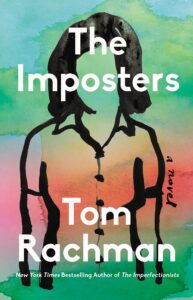
Tom Rachman, The Imposters
Little, Brown, June 27
From the author of The Imperfectionists and The Italian Teacher comes the story of an octogenarian novelist desperate to finish her final book before it’s too late—and gets the chance to do just that during an isolated Covid lockdown. Dora’s stories span her lifetime and the globe, culminating in a grand tapestry of humanity. –ES
Emma Törzs, Ink Blood Sister Scribe
William Morrow, June 27
The HarperCollins Union has been on strike since November 10, 2022. Literary Hub stands in solidarity with the union. Please consider donating to the strike fund.
The publicity copy for this book compares it to Ninth House, The Magicians, and Practical Magic, three things that I find completely delightful—and that’s before I realized that this is a novel about half-sisters tasked with guarding their family’s library of magical books. Yep, delicious, give it. –ET
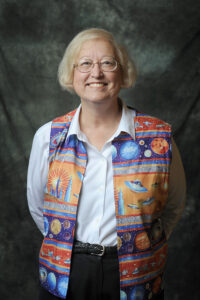
Connie Willis, The Road to Roswell
Del Rey, June 27
Connie Willisheads, rejoice! 2023 is bringing us an alien-themed rom-com from the Nebula and Hugo Award–winning author. Set, of course, in Roswell, New Mexico, the book follows Francie, who’s begrudgingly in town for an old friend’s UFO-themed wedding (complete with lime green bridesmaid dresses). When she’s—surprise!—abducted, along with a cohort of randos, she’ll have to rethink everything she thinks she knows about little green men. It’ll be nigh impossible to top Willis’s Oxford Time Travel series, but I am delighted regardless. –ES
JULY
Patrick DeWitt, The Librarianist
Ecco, July 4
The HarperCollins Union has been on strike since November 10, 2022. Literary Hub stands in solidarity with the union. Please consider donating to the strike fund.
Full disclosure: I will read anything Patrick DeWitt writes. The Sisters Brothers is one of the funniest novels in recent memory, and French Exit was purely, and darkly, delightful. So, though my buy-in was all but guaranteed, and The Librarianist—which tells the story of a retired librarian who tries to inject meaning into his newly wide open days by volunteering at a senior center—seems like a perfect showcase for DeWitt’s wit(t), and for his funny, off-kilter, beautifully human characters. –JG
Nicole Flattery, Nothing Special
Bloomsbury, July 11
Irish writer and critic Nicole Flattery’s brilliant 2019 debut Show Them a Good Time, which the Guardian called “a highly addictive mix of deadpan drollery and candor” and Lauren Oyler in Bookforum memorably described as “a bit like drinking: refreshingly obliterative, realistically distorted,” is one of the best short fiction collections to come out of Ireland in recent years, and deservedly won the Galway-based author a clutch of awards. Flattery’s hotly anticipated first novel is a coming-of-age story about a disaffected teenage girl who takes a job transcribing taped conversations at Andy Warhol’s Factory in 1960s New York City. For fans of Lorrie Moore, Mary Gaitskill, and Deborah Levy. –DS
Caleb Azumah Nelson, Small Worlds
Grove, July 11
For his gorgeous debut novel, Caleb Azumah Nelson was awarded the Costa First Novel Award, the British Book Award for Debut Fiction, and the National Book Foundation’s 5 Under 35 distinction. Now the author of Open Water is back with a novel that promises to be just as captivating. Small Worlds introduces us to Stephen, a first-generation Londoner, son of Ghanian immigrants. His life is supposed to follow a specific track (read: a university degree), but he veers off course when he chooses to pursue music instead. It’s a story about an artist feeling the opposite pulls of family and his true passion, and how splintering those demands can be. A chance to get lost in Caleb Azumah Nelson’s sonorous prose again? Music to our ears. –KY
Andrew Lipstein, The Vegan
FSG, July 11
I inhaled Andrew Lipstein’s debut novel Last Resort (which just came out in 2022, damn him), a book about storytelling and greed and New York and artistic ownership, so I’m eagerly anticipating his next, which seems to be equally invested in asking questions about the murky nature of morality in our modern world. Andrew Martin called it “a feverish, fantastically surprising parable about guilt, money, and (curveball) the lives of animals,” and writes that it “reads like the unholy offspring of Saul Bellow’s Seize the Day and Julio Cortázar’s cosmic short fiction, or Crime and Punishment for the Brooklyn brownstone set,” which is about as good a blurb as you could get. –ET
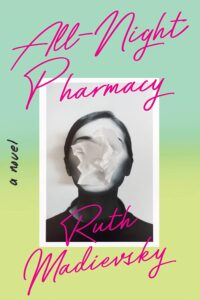
Ruth Madievsky, The All-Night Pharmacy
Catapult, July 11
I know and love Ruth Madievsky’s writing from her work for this very website, so I’m looking forward to her debut novel, billed as “Rachel Kushner meets David Lynch” (I mean!). After the novel’s unnamed narrator accompanies her rebellious and charismatic sister, Debbie, to a pill-addled evening at a Los Angeles bar, Debbie disappears, setting off the narrator’s uneasy journey—complete with sex, drugs, and mysticism. –JG
Sarah Rose Etter, Ripe
Scribner, July 11
The latest novel from the author of The Book of X, which won a Shirley Jackson Award for Best Novel, is about a millennial woman working at a toxic Silicon Valley startup, always accompanied, as she has been since childhood, by her own personal black hole. Yep. Laura van den Berg called this “a harrowing and mordantly hilarious send-up of the horrors of late-stage capitalism, and a potent meditation on the search for meaning in a broken world,” which only makes me want to read it more. –ET
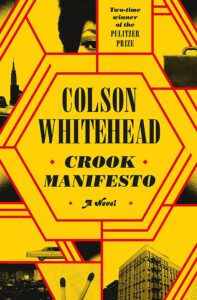
Colson Whitehead, Crook Manifesto
Doubleday, July 18
The eagerly awaited sequel to Harlem Shuffle is hitting the shelves this July. We find ourselves back with Ray Carney in Harlem in the 70s, as he recommits to the straight-and-narrow life, then slips up again, recommits, but can’t stay away from his crooked leanings and connections. A decade-spanning work that encompasses crime, police brutality, racism, family, and the desperate will to stay afloat, Crook Manifesto delivers on the high-bar its preceding novels set, offering a thoroughly-researched, well drawn portrait of a specific time, man, and place. –JH
Dwyer Murphy, The Stolen Coast
Viking, July 18
If the lovers at the heart of Casablanca had met about 30 years later, and had a kid, and then that kid and his dad started a business, then the story might have gone something like CrimeReads Editor-in-Chief Dwyer Murphy’s upcoming New England beach thriller, The Stolen Coast. Murphy’s hero and his retired spy dad have an unusual business helping people on the run, using the legions of homes left abandoned outside of the summer season. When an ex-girlfriend shows up with a plan for a diamond heist, the risks of an already-dangerous job go through the roof, but the rewards may just be big enough to be worth it. I have been assured that this book has no boat shoes. –MO
AUGUST & beyond
Jamel Brinkley, Witness
FSG, August 1
Jamel Brinkley’s debut story collection, A Lucky Man, was something of a sensation upon its release in 2018, receiving a raft of major literary award nominations (including National Book Award, PEN/Robert W. Bingham Prize for Debut Fiction, the Story Prize, and the John Leonard Prize nods), as well as near-unanimous critical acclaim (the Guardian called it “near faultless”), so expectations are high for his follow-up. These ten stories in this new collection (which comes with blurbs from luminaries like Justin Torres, Raven Lelani, and Angela Flournoy, and Yiyun Li), are portraits of intimacy and friendship, grief and mourning, all set “in the changing landscapes of contemporary New York City.” Expect this to be one of the standout collections of the year. –DS
Jimin Han, The Apology
Little, Brown, August 1
Jimin Han’s latest novel, “part ghost story and part family epic,” promises to be tooth-sinkingly great. I mean: “In South Korea, a 105-year-old woman receives a letter. Ten days later, she has been thrust into the afterlife, fighting to head off a curse that will otherwise devastate generations to come.” It sounds like the kind of sprawling and ambitious novel that is wildly satisfying to read when handled well, and given the brilliance of Han’s previous novel, A Small Revolution, I have no doubt it will be. Get excited for this one. –JG
Edan Lepucki, Time’s Mouth
Counterpoint, August 1
Time’s Mouth is a Californian-dystopian-time-travel novel from the author of Woman No. 17. It’s about cults, motherhood, abandonment, and trying to right the wrongs of the past—usually impossible, except in this work characters can travel into their memories. It’s well past time for another cult-y novel to take us by storm, and Time’s Mouth very well may be it. –JH
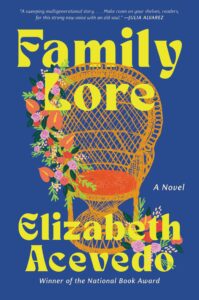
Elizabeth Acevedo, Family Lore
Ecco, August 1
The HarperCollins Union has been on strike since November 10, 2022. Literary Hub stands in solidarity with the union. Please consider donating to the strike fund.
Family Lore is the first novel for adults from Elizabeth Acevedo, who won the National Book Award in Young People’s Literature for her 2018 debut, The Poet X. It is the story of one big Dominican-American family, centered on four sisters—one of whom has an uncanny ability to predict when people will die. So when she asks to bring the family together for a living wake, everyone shows, bringing all their secrets and troubles with them. Sounds very juicy. –ET
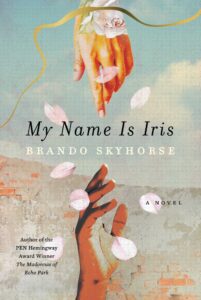
Brando Skyhorse, My Name is Iris
Avid Reader Press, August 1
From the PEN/Hemingway Award–winning author of The Madonnas of Echo Park, a novel set five minutes in the future, in an America in which all citizens wear high-tech identification wristbands—all citizens who can prove “parental citizenship,” that is, leaving second-generation Americans like Iris out in an increasingly violent and frightening cold. –ET
Lydia Kiesling, Mobility
Crooked Media Reads, August 1
Lydia Kiesling is a smart and funny writer who is unafraid of getting her hands dirty with politics. This is my favorite kind of novelist. So I am very much looking forward to Mobility, which follows the life of Bunny Glenn (Pynchon says hi) from her teenage years visiting newly post-Soviet Azerbaijan to her present-day career in the oil industry… and all the crazy, globally important stuff that happened in between. It’s almost like history didn’t end, not even one bit! –JD
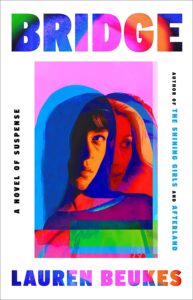
Lauren Beukes, Bridge
Mulholland, August 8
I’m a big fan of Beukes’ horror-tinged, speculative suspense novels—she is apparently an endless well of terrifyingly good ideas. For instance: in this novel, a woman who can’t make up her mind about anything finds an object she thought was imaginary in her dead mother’s freezer: the “dreamworm,” which opens up a path to all other realities—and a million and one dangers. Fun! –ET

James McBride, The Heaven & Earth Grocery Store
Riverhead, August 8
The arrival of a new novel by National Book Award-winner James McBride (The Good Lord Bird, Deacon King Kong)—a masterful storyteller who always brings a deep well of humanity and humor to his exuberant, expansive tales—is a cause for celebration. The Heaven & Earth Grocery Store (another amazing title) is set in a run-down neighborhood in a small Pennsylvania town in 1972. Peopled by a cast of immigrant Jewish and Black characters, and centered around the mystery of skeleton found at the bottom of a well, this sounds like another knockout ensemble piece from McBride. –DS

Paul Murray, The Bee Sting
FSG, August 15
At last, a new novel from Paul Murray, who you probably fell in love with after 2010’s delightful campus novel Skippy Dies. His latest promises to be equally tragicomic, centered on a family teetering at the edge of a series of disasters, big and small. Can’t wait to bang around in his weird and wonderful brain again. –ET
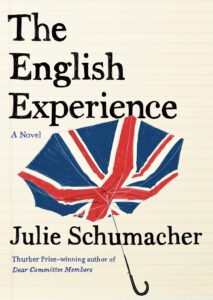
Julie Schumacher, The English Experience
Doubleday, August 15
Alert, alert: Julie Schumacher is back with the third and final book in the hysterical campus novel trilogy (Dear Committee Members, The Shakespeare Requirement) starring beleaguered academic Jason Fitger, who to the dismay of all must chaperone Payne University’s annual “Experience: Abroad” to—you guessed it—the UK. I’m actually trying to wait read this because I want to be able to savor it completely, but I don’t think I’m going to be able to wait very long. –ET
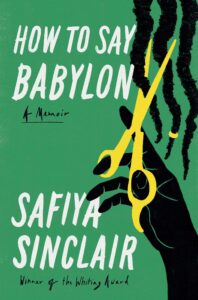
Safiya Sinclair, How to Say Babylon
Simon & Schuster, August 29
If you haven’t read Safiya Sinclair’s poetry collection, Cannibal, yet, you should do that immediately. You will fall in love with the way she wields language, with her ability to conjure history and turn myth in on itself, and then you will undoubtedly understand why it’s so exciting that her memoir will be gracing us with its presence this summer. In How to Say Babylon, Safiya Sinclair explores her strict Rastafarian upbringing, examining her relationship with her controlling father. Under his roof, women were to be obedient and to not have opinions. So it was a lifeline when her mother started sharing books, especially poetry, with her children. This memoir is a story of rebellion, culture clash, and a love letter to the curative powers of literature. In Cannibal, Safiya Sinclair draws heavily on Genesis and the story of Eve; How to Say Babylon is a writing of her own origin story. –KY
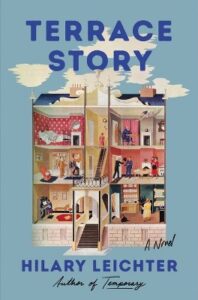
Hilary Leichter, Terrace Story
Ecco, August 29
The HarperCollins Union has been on strike since November 10, 2022. Literary Hub stands in solidarity with the union. Please consider donating to the strike fund.
Hell yes, new Hilary Leichter! The sophomore novel from the author of Temporary is a fable that starts out with every New Yorker’s dream: finding a secret terrace hidden in their tiny apartment. For Annie and Edward, and their daughter Rose, the terrace is in the closet, and it’s great—except for the ways it changes their apartment, their family, and whoops, the world. If you can’t wait, the novel is based on Leichter’s 2020 Harper’s story, which you can read here. –ET

Mona Awad, Rouge
Scribner, September
!!! I don’t know anything about Mona Awad’s next novel, except that it’s coming in September, and that, if it is anything like her previous works, it is likely to be delicious and daring and weird and terrifying. Fall can’t come soon enough. –ET

Lauren Groff, The Vaster Wilds
Riverhead, September 10
The years are speeding up with abandon, so while Matrix feels like yesterday, it’s been nearly three years and it’s time for the prolific Groff to gift us with another novel. The Vaster Wilds was what she was working on and then set aside to write Matrix, but she describes the two as “a loosely thematically-linked sisterhood.” There still isn’t a huge amount of information released about the new work, but in The Atlantic in 2021 it was described as: “a kind of ‘female Robinson Crusoe’ set in 1609 Jamestown, in which a woman grapples with the constructs of religion and the compromises she has to make to survive. Those two books [Matrix and The Vaster Wilds] and a third she’s working on all spin around a central thesis: the idea that so much of our present suffering comes from a misreading of Genesis.” Matrix was a totally unique, innovative addition to Groff’s oeuvre, which can only bode well for The Vaster Wilds as a sister novel. –JH

C Pam Zhang, Land of Milk and Honey
Riverhead, September 29
Hungry for more of C Pam Zhang’s writing after How Much of These Hills Is Gold? Me, too. We’re in luck. Land of Milk and Honey takes us to a near future in which our resources for food are disappearing. Here we meet a Chinese American chef who is coerced into working for a wealthy colony, where she’ll grapple with the ethics of stark class division and try to find pleasure in this dumpster fire of a planet. (I’m picturing the scene in Ratatouille in which Remy takes a bite of cheese and a bite of strawberry, and all the flavors and colors blend together beautifully? I’m imagining this hunt for happiness to look like that, but literary and, dare I say, even better.) In a tweet announcing the publication of her next novel, C Pam Zhang wrote: “The joy of writing this was a lifeline in dark times; I hope it brings you joy to read, too.” More joy in 2023! –KY

Nicola Griffith, Menewood
MCD, October 3
Ten years after the publication of Hild, Griffith’s beloved retelling of the life of Hilda of Whitby, we’re finally getting a sequel, in which Hild is all grown up and building her stronghold in the titular Menewood—but war is coming, and Edwin needs her yet again. Middle Ages, here I come. –ET

Bryan Washington, Family Meal
Riverhead, October 10
If you loved Lot and Memorial, you’re going to want to pay attention to this: 5 Under 35 winner Bryan Washington is back with a brand-new novel! I’m sure it will be just as poignant and funny and moving as his last. If the title is any indication, there will likely be more insightful dissections of community (something he does so well), and (hopefully) many more descriptions of food. Family Meal is coming to independent bookstores near you this fall. Dig in! –KY

E.J. Koh, The Liberators
Tin House, Fall 2023
Is there anything E.J. Koh can’t do? She’s a cherished poet (A Lesser Love), a gifted memoirist (The Magical Language of Others), an award-winning translator (The World’s Lightest Motorcycle), and now (thankfully) she is going to add novelist to that list. Not much information has been revealed about the story yet, but E.J. Koh always operates with a kind of alchemy; what she touches turns to gold. –KY

Isle McElroy, People Collide
HarperVia, Fall 2023
The HarperCollins Union has been on strike since November 10, 2022. Literary Hub stands in solidarity with the union. Please consider donating to the strike fund.
McElroy’s debut The Atmospherians was a twisted, fun satire about a disgraced influencer and a failing actor who form a cult designed to reform problematic men of their toxic masculinity. In their new novel, a man wakes up to find he is in his wife’s body. What follows, according to the publisher, “is a search across Europe for a missing woman—and a roving, no-holds-barred exploration of gender and embodied experience.” Yes! –EF

Naomi Alderman, The Future
Simon & Schuster, Fall 2023
We don’t know much yet about Naomi Alderman’s new novel, but I know enough to confirm that it’s got a prime spot on my TBR list. In Alderman’s The Power, women discover they can channel electricity through their fingertips, and in Disobedience, a closeted woman leaves her Orthodox community after reuniting with an old flame. In The Future, Alderman turns her lens to Silicon Valley, where a group of rogues overthrow our tech overlords. We can only hope. –ES

Vauhini Vara, This is Salvaged
W.W. Norton, Fall 2023
Vauhini Vara’s stunning and imaginative debut novel, The Immortal King Rao, made quite a splash this year. It garnered rave reviews! It was a finalist for the Center for Fiction’s prestigious First Novel Prize! How exciting for us, then, that her short story collection is coming out in 2023. She’s a writer who packs a punch, and personally, I’m excited to see what magic she can conjure in the condensed form. Although we don’t know much about This Is Salvaged yet, one thing is certain: it’s something to look forward to. –KY

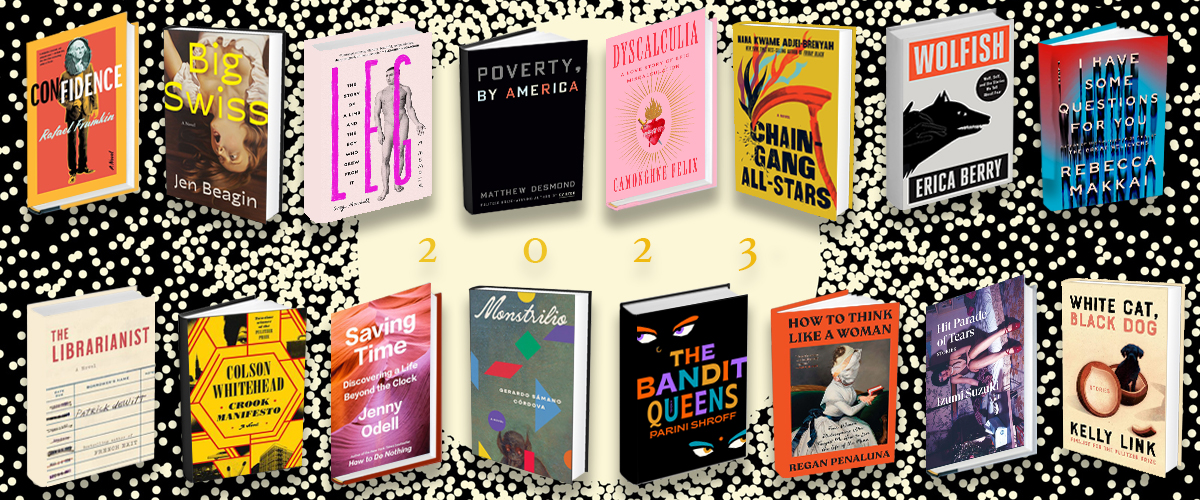
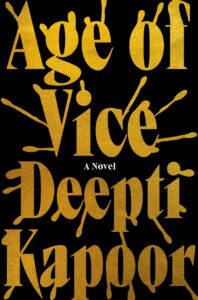
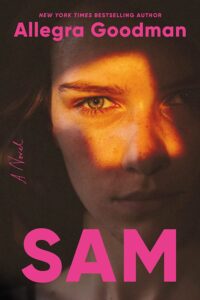
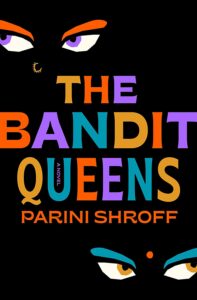
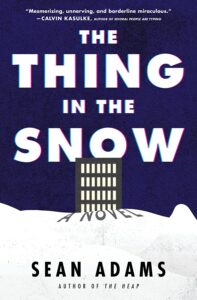
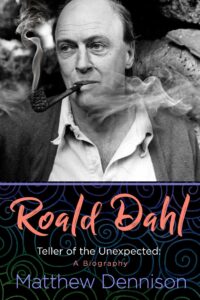
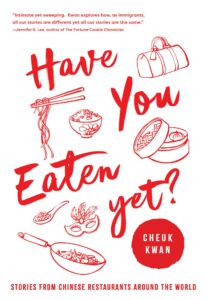
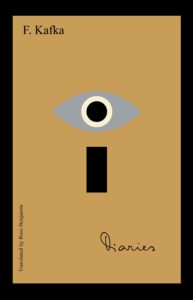

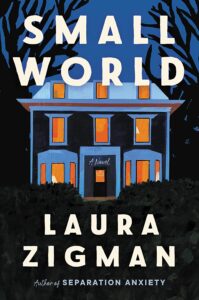
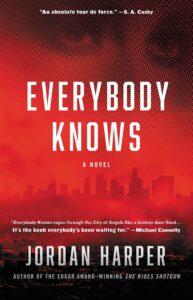
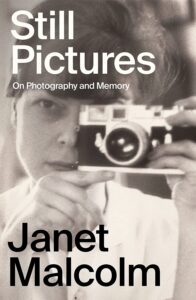
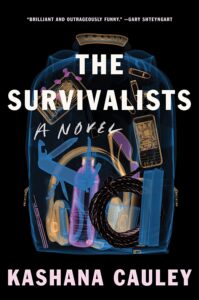
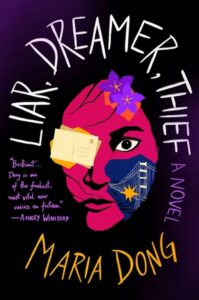

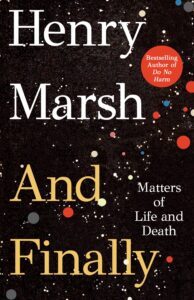

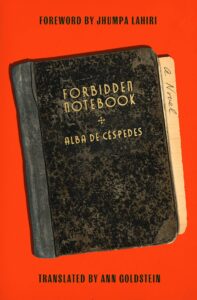
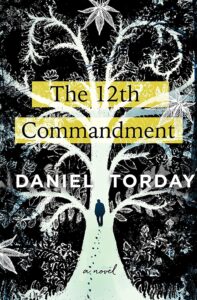
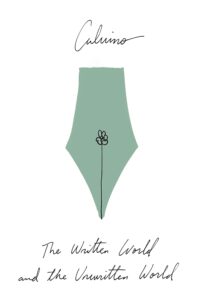
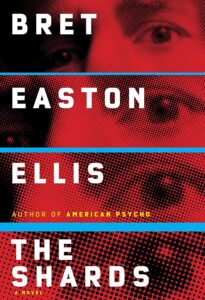
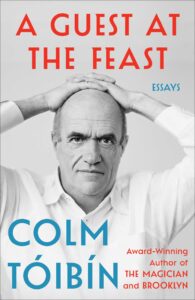

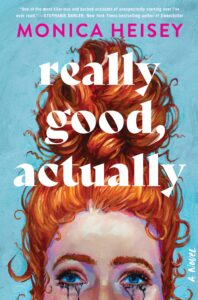
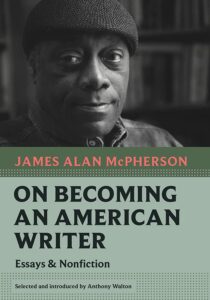
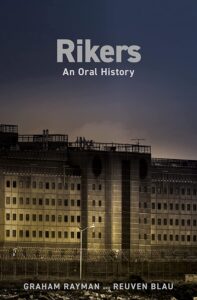
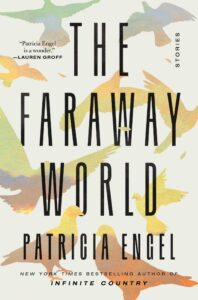
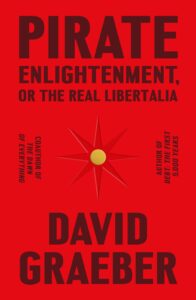
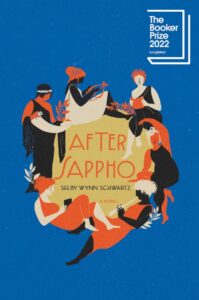
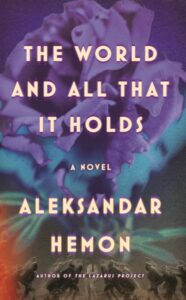
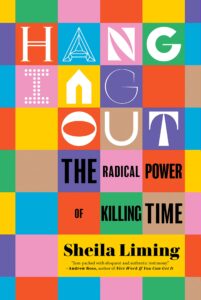
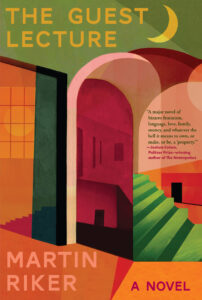
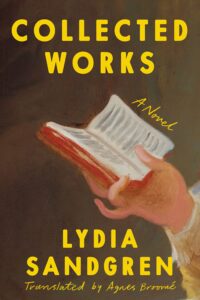

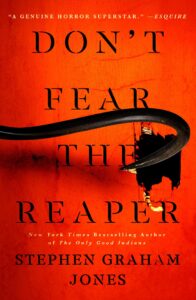

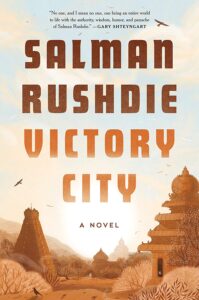
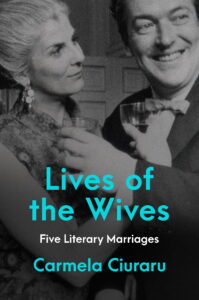

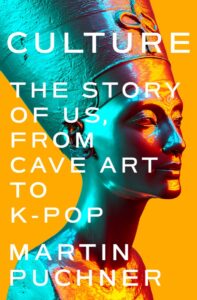
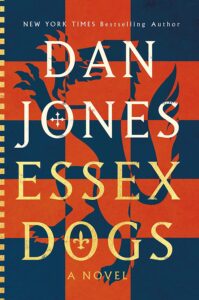
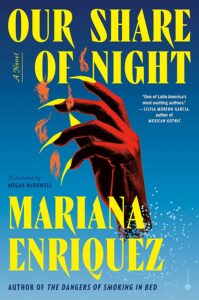
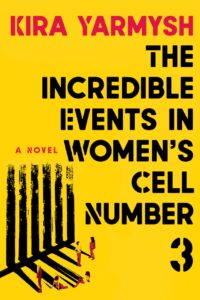
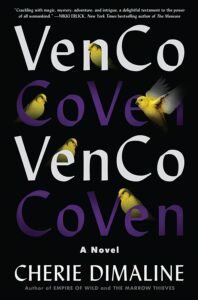
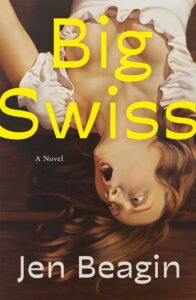
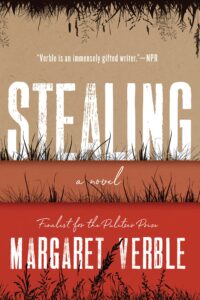
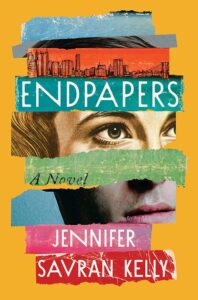
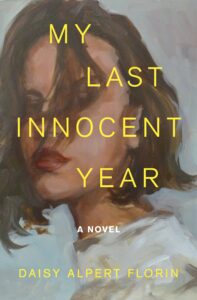
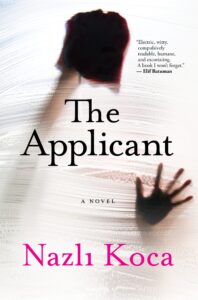

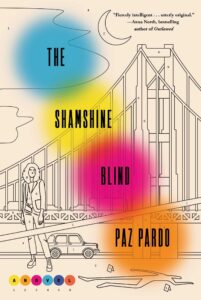
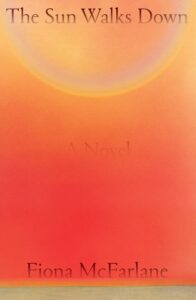
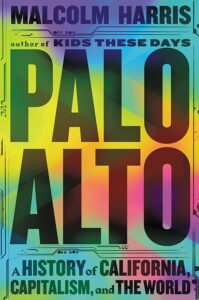
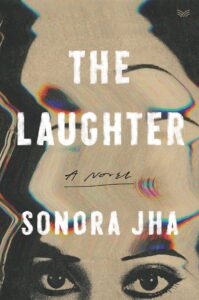
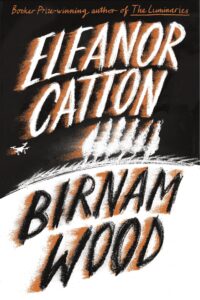
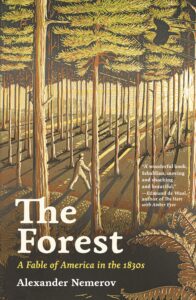
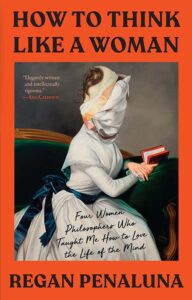
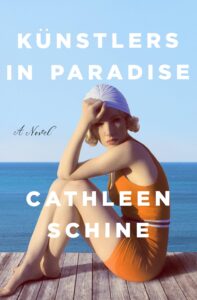
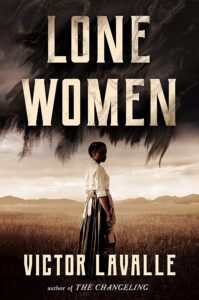
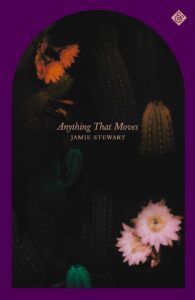
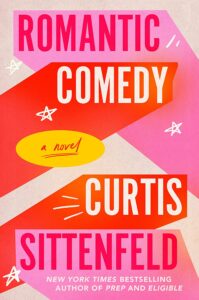
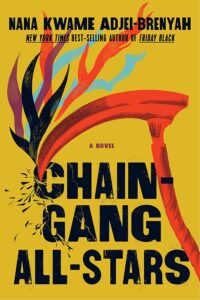
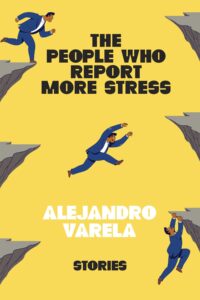

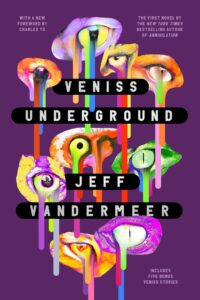
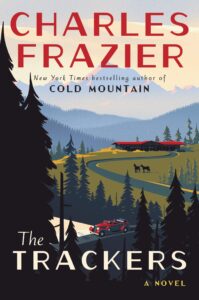
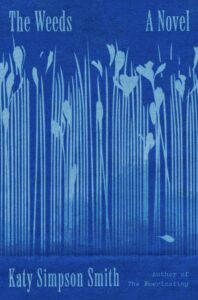


![Hannah Pittard, We Are Too Many: A Memoir [Kind of]](https://s26162.pcdn.co/wp-content/uploads/2022/12/9781250869043-1-197x300.jpg)
